
How To Choose A Research Topic
Step-By-Step Tutorial With Examples + Free Topic Evaluator
By: Derek Jansen (MBA) | Expert Reviewer: Dr Eunice Rautenbach | April 2024
Choosing the right research topic is likely the most important decision you’ll make on your dissertation or thesis journey. To make the right choice, you need to take a systematic approach and evaluate each of your candidate ideas across a consistent set of criteria. In this tutorial, we’ll unpack five essential criteria that will help you evaluate your prospective research ideas and choose a winner.
Overview: The “Big 5” Key Criteria
- Topic originality or novelty
- Value and significance
- Access to data and equipment
- Time limitations and implications
- Ethical requirements and constraints
Criterion #1: Originality & Novelty
As we’ve discussed extensively on this blog, originality in a research topic is essential. In other words, you need a clear research gap . The uniqueness of your topic determines its contribution to the field and its potential to stand out in the academic community. So, for each of your prospective topics, ask yourself the following questions:
- What research gap and research problem am I filling?
- Does my topic offer new insights?
- Am I combining existing ideas in a unique way?
- Am I taking a unique methodological approach?
To objectively evaluate the originality of each of your topic candidates, rate them on these aspects. This process will not only help in choosing a topic that stands out, but also one that can capture the interest of your audience and possibly contribute significantly to the field of study – which brings us to our next criterion.

Criterion #2: Value & Significance
Next, you’ll need to assess the value and significance of each prospective topic. To do this, you’ll need to ask some hard questions.
- Why is it important to explore these research questions?
- Who stands to benefit from this study?
- How will they benefit, specifically?
By clearly understanding and outlining the significance of each potential topic, you’ll not only be justifying your final choice – you’ll essentially be laying the groundwork for a persuasive research proposal , which is equally important.
Criterion #3: Access to Data & Equipment
Naturally, access to relevant data and equipment is crucial for the success of your research project. So, for each of your prospective topic ideas, you’ll need to evaluate whether you have the necessary resources to collect data and conduct your study.
Here are some questions to ask for each potential topic:
- Will I be able to access the sample of interest (e.g., people, animals, etc.)?
- Do I have (or can I get) access to the required equipment, at the time that I need it?
- Are there costs associated with any of this? If so, what are they?
Keep in mind that getting access to certain types of data may also require special permissions and legalities, especially if your topic involves vulnerable groups (patients, youths, etc.). You may also need to adhere to specific data protection laws, depending on the country. So, be sure to evaluate these aspects thoroughly for each topic. Overlooking any of these can lead to significant complications down the line.

Criterion #4: Time Requirements & Implications
Naturally, having a realistic timeline for each potential research idea is crucial. So, consider the scope of each potential topic and estimate how long each phase of the research will take — from literature review to data collection and analysis, to writing and revisions. Underestimating the time needed for a research project is extremely common , so it’s important to include buffer time for unforeseen delays.
Remember, efficient time management is not just about the duration but also about the timing . For example, if your research involves fieldwork, there may specific times of the year when this is most doable (or not doable at all). So, be sure to consider both time and timing for each of your prospective topics.
Criterion #5: Ethical Compliance
Failing to adhere to your university’s research ethics policy is a surefire way to get your proposal rejected . So, you’ll need to evaluate each topic for potential ethical issues, especially if your research involves human subjects, sensitive data, or has any potential environmental impact.
Remember that ethical compliance is not just a formality – it’s a responsibility to ensure the integrity and social responsibility of your research. Topics that pose significant ethical challenges are typically the first to be rejected, so you need to take this seriously. It’s also useful to keep in mind that some topics are more “ethically sensitive” than others , which usually means that they’ll require multiple levels of approval. Ideally, you want to avoid this additional admin, so mark down any prospective topics that fall into an ethical “grey zone”.
If you’re unsure about the details of your university’s ethics policy, ask for a copy or speak directly to your course coordinator. Don’t make any assumptions when it comes to research ethics!
Key Takeaways
In this post, we’ve explored how to choose a research topic using a systematic approach. To recap, the “Big 5” assessment criteria include:
- Topic originality and novelty
- Time requirements
- Ethical compliance
Be sure to grab a copy of our free research topic evaluator sheet here to fast-track your topic selection process. If you need hands-on help finding and refining a high-quality research topic for your dissertation or thesis, you can also check out our private coaching service .
Need a helping hand?
You Might Also Like:

Submit a Comment Cancel reply
Your email address will not be published. Required fields are marked *
Save my name, email, and website in this browser for the next time I comment.
- Print Friendly
Selecting a Research Topic: Overview
- Refine your topic
- Background information & facts
- Writing help
Here are some resources to refer to when selecting a topic and preparing to write a paper:
- MIT Writing and Communication Center "Providing free professional advice about all types of writing and speaking to all members of the MIT community."
- Search Our Collections Find books about writing. Search by subject for: english language grammar; report writing handbooks; technical writing handbooks
- Blue Book of Grammar and Punctuation Online version of the book that provides examples and tips on grammar, punctuation, capitalization, and other writing rules.
- Select a topic
Choosing an interesting research topic is your first challenge. Here are some tips:
- Choose a topic that you are interested in! The research process is more relevant if you care about your topic.
- If your topic is too broad, you will find too much information and not be able to focus.
- Background reading can help you choose and limit the scope of your topic.
- Review the guidelines on topic selection outlined in your assignment. Ask your professor or TA for suggestions.
- Refer to lecture notes and required texts to refresh your knowledge of the course and assignment.
- Talk about research ideas with a friend. S/he may be able to help focus your topic by discussing issues that didn't occur to you at first.
- WHY did you choose the topic? What interests you about it? Do you have an opinion about the issues involved?
- WHO are the information providers on this topic? Who might publish information about it? Who is affected by the topic? Do you know of organizations or institutions affiliated with the topic?
- WHAT are the major questions for this topic? Is there a debate about the topic? Are there a range of issues and viewpoints to consider?
- WHERE is your topic important: at the local, national or international level? Are there specific places affected by the topic?
- WHEN is/was your topic important? Is it a current event or an historical issue? Do you want to compare your topic by time periods?
Table of contents
- Broaden your topic
- Information Navigator home
- Sources for facts - general
- Sources for facts - specific subjects
Start here for help
Ask Us Ask a question, make an appointment, give feedback, or visit us.
- Next: Refine your topic >>
- Last Updated: Jul 30, 2021 2:50 PM
- URL: https://libguides.mit.edu/select-topic

- Customer Reviews
- Extended Essays
- IB Internal Assessment
- Theory of Knowledge
- Literature Review
- Dissertations
- Essay Writing
- Research Writing
- Assignment Help
- Capstone Projects
- College Application
- Online Class
How to Select a Research Topic: A Step-by-Step Guide (2021)
by Antony W
September 15, 2021
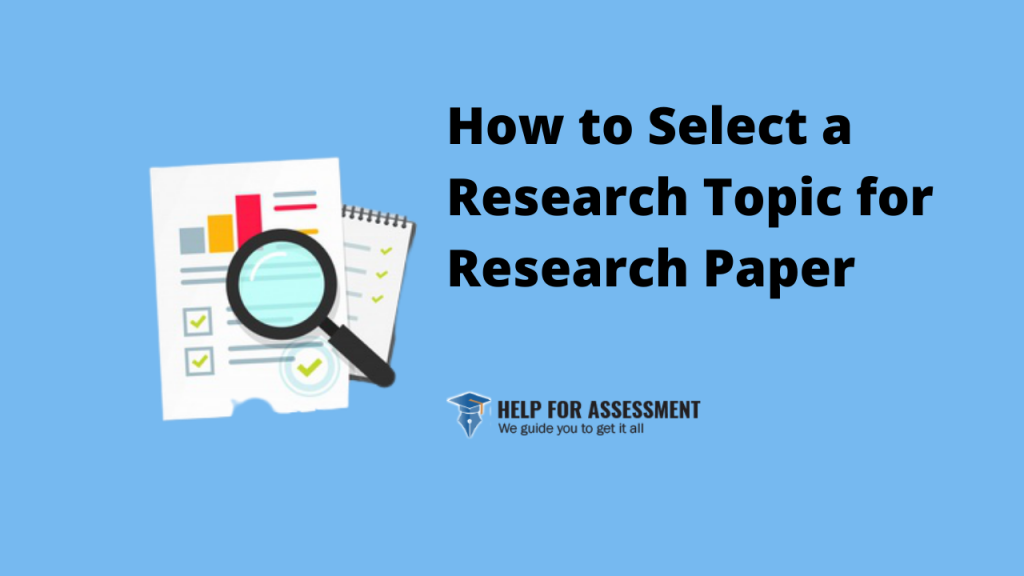
Learning how to select a research topic can be the difference between failing your assignment and writing a comprehensive research paper. That’s why in this guide we’ll teach you how to select a research topic step-by-step.
You don’t need this guide if your professor has already given you a list of topics to consider for your assignment . You can skip to our guide on how to write a research paper .
If they have left it up to you to choose a topic to investigate, which they must approve before you start working on your research study, we suggest that you read the process shared in this post.
Choosing a topic after finding your research problem is important because:
- The topic guides your research and gives you a mean to not only arrive at other interesting topics but also direct you to discover new knowledge
- The topic you choose will govern what you say and ensures you keep a logical flow of information.
Picking a topic for a research paper can be challenging and sometimes intimidating, but it’s not impossible. In the following section, we show you how to choose the best research topic that your instructor can approve after the first review.
How to Select a Research Topic
Below are four steps to follow to find the most suitable topic for your research paper assignment:
Step 1: Consider a Topic that Interests You
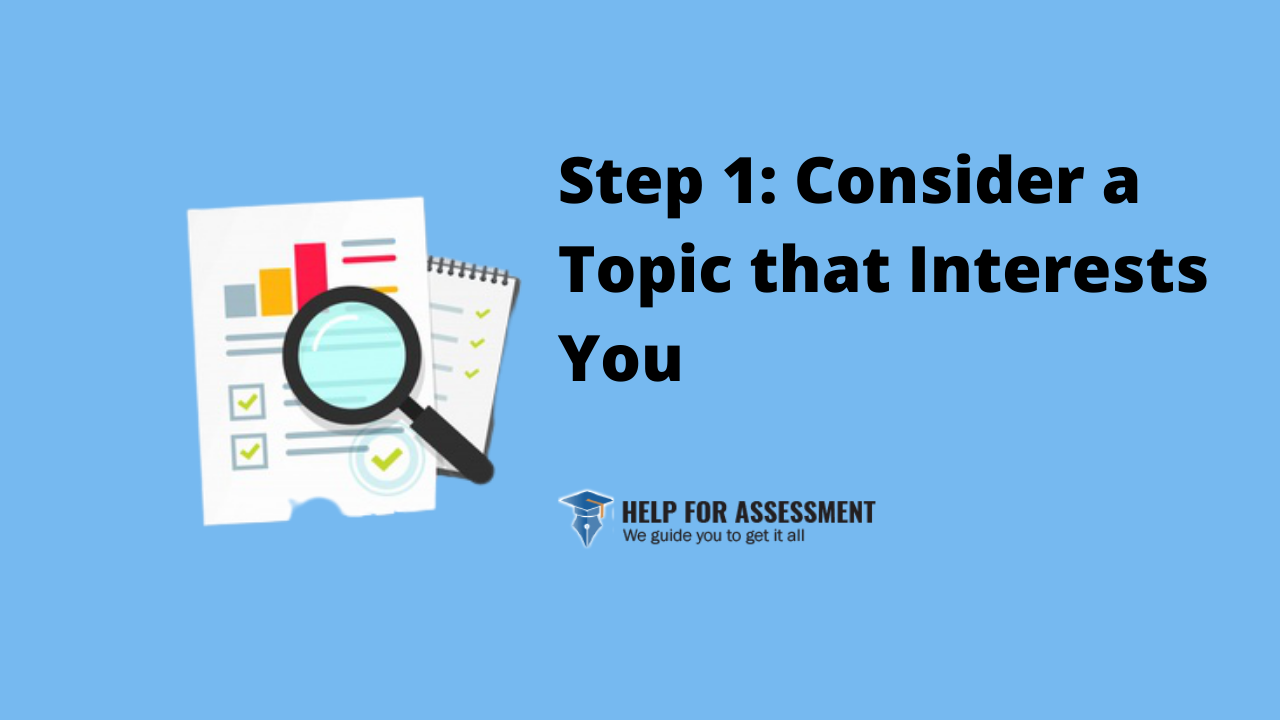
If your professor has asked you to choose a topic for your research paper, it means you can choose just about any subject to focus on in your area of study. A significant first step to take is to consider topics that interest you.
An interesting topic should meet two very important conditions.
First, it should be concise. The topic you choose should not be too broad or two narrow. Rather, it should be something focused on a specific issue. Second, the topic should allow you to find enough sources to cite in the research stage of your assignment.
The best way to determine if the research topic is interesting is to do some free writing for about 10 minutes. As you free write, think about the number of questions that people ask about the topic and try to consider why they’re important. These questions are important because they will make the research stage easier for you.
You’ll probably have a long list of interesting topics to consider for your research assignment. That’s a good first step because it means your options aren’t limited. However, you need to narrow down to only one topic for the assignment, so it’s time to start brainstorming.
Step 2: Brainstorm Your Topics
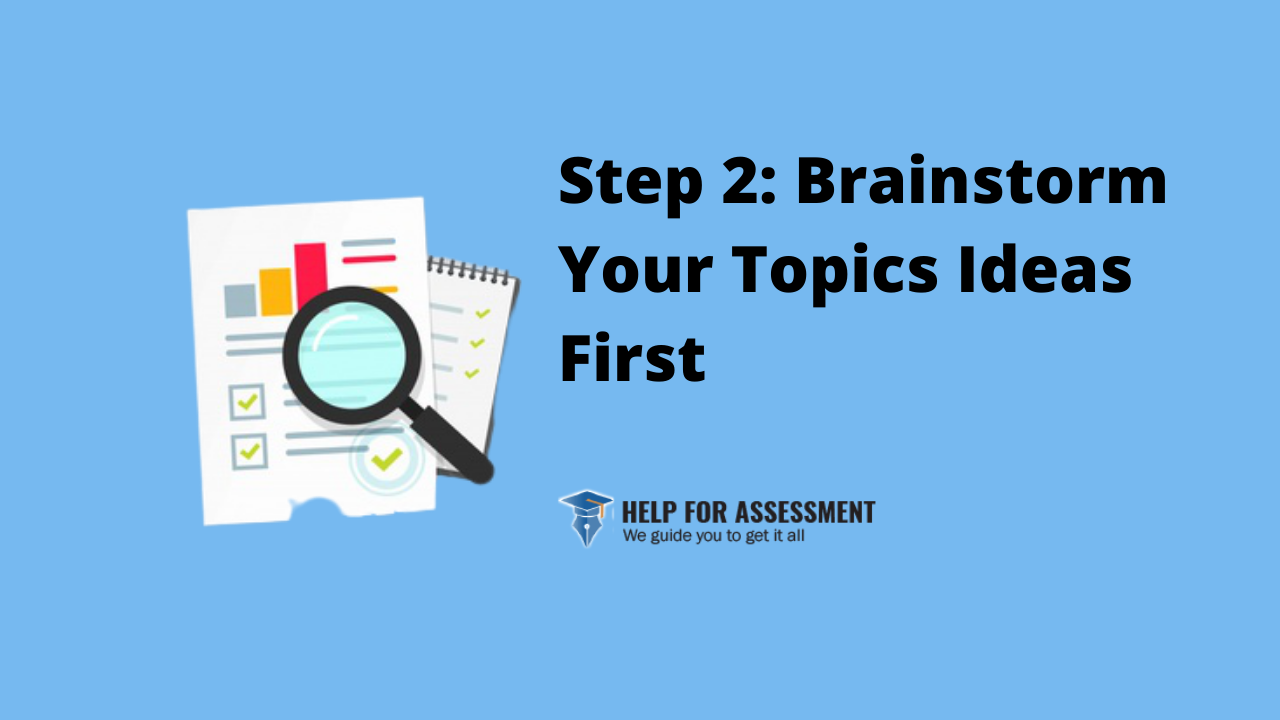
You aren’t doing research at this stage yet. You are only trying to make considerations to determine which topic will suit your research assignment.
The brainstorming stage isn’t difficult at all. It should take only a couple of hours or a few days depending on how you approach.
We recommend talking to your professor, classmates, and friends about the topics that you’ve picked and ask for their opinion. Expect mixed opinions from this audience and then consider the topics that make the most sense. Note what topics picked their interest the most and put them on top of the list.
You’ll end up removing some topics from your initial list after brainstorming, and that’s completely fine. The goal here is to end up with a topic that interests you as well as your readers.
Step 3: Define Your Topics
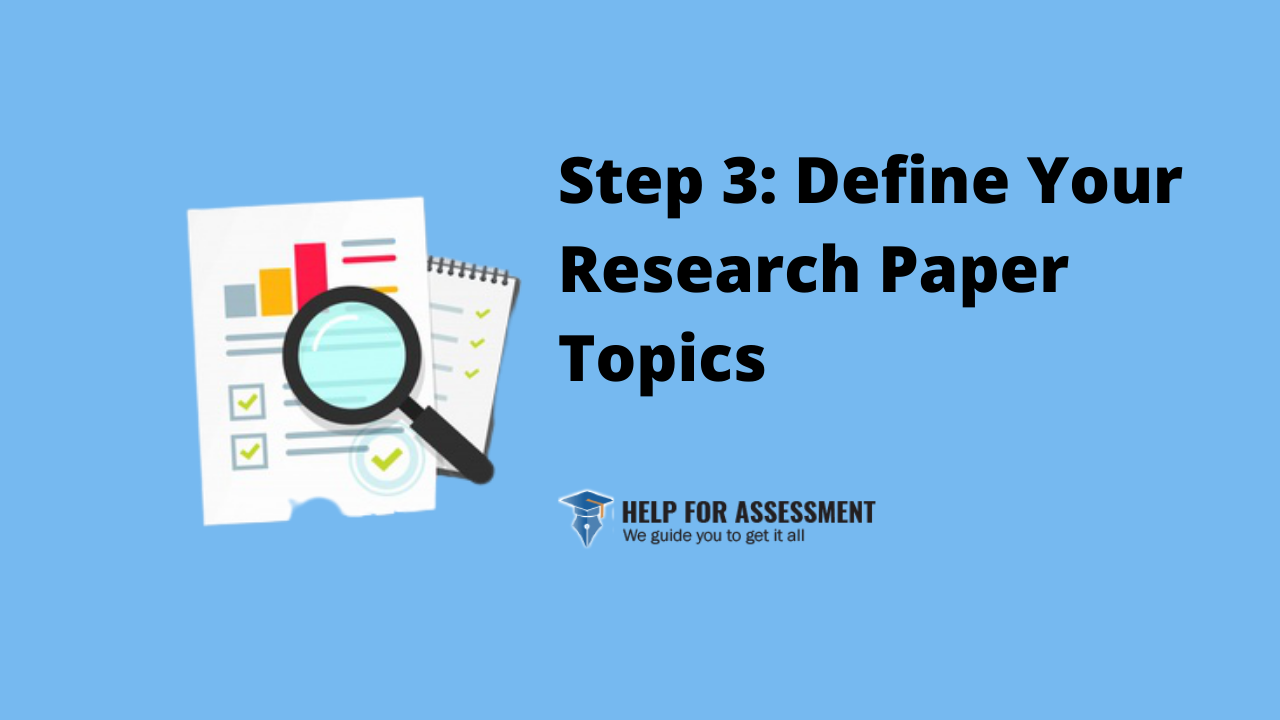
Check once again to make sure that your topic is a subject that you can easily define. You want to make sure the topic isn’t too broad or too narrow.
Often, a broad topic presents overwhelming amount of information, which makes it difficult to write a comprehensive research paper. A narrow topic, on the other hand, means you’ll find very little information, and therefore it can be difficult to do your assignment.
The length of the research paper, as stated in the assignment brief, should guide your topic selection.
Narrow down your list to topics that are:
- Broad enough to allows you to find enough scholarly articles and journals for reference
- Narrow enough to fit within the expected word count and the scope of the research
Topics that meet these two conditions should be easy to work on as they easily fit within the constraints of the research assignment.
Step 4: Read Background Information of Selected Topics

You probably have two or three topics by the time you get to this step. Now it’s time to read the background information on the topics to decide which topic to work on.
This step is important because it gives you a clear overview of the topic, enabling you to see how it relates to broader, narrower, and related concepts. Preliminary research also helps you to find keywords commonly used to describe the topic, which may be useful in further research.
It’s important to note how easy or difficult it is to find information on the topic.
Look at different sources of information to be sure you can find enough references for the topic. Such periodic indexes scan journals, newspaper articles, and magazines to find the information you’re looking for. You can even use web search engines. Google and Bing are currently that best options to consider because they make it easy for searchers to find relevant information on scholarly topics.
If you’re having a hard time to find references for a topic that you’ve so far considered for your research paper, skip it and go to the next one. Doing so will go a long way to ensure you have the right topic to work on from start to finish.
Get Research Paper Writing Help
If you’ve found your research topic but you feel so stuck that you can’t proceed with the assignment without some assistance, we are here to help. With our research paper writing service , we can help you handle the assignment within the shortest time possible.
We will research your topic, develop a research question, outline the project, and help you with writing. We also get you involved in the process, allowing you to track the progress of your order until the delivery stage.
About the author
Antony W is a professional writer and coach at Help for Assessment. He spends countless hours every day researching and writing great content filled with expert advice on how to write engaging essays, research papers, and assignments.
Start your research
Picking a good topic, step 1: choose a topic.
The first step in doing research is choosing a good topic. A good research topic should be focused and clear and not something that can be answered by a Google search.
For example, instead of asking "Why is social media harmful?" you could ask, "How is interacting with social media, like TikTok and Twitter, impacting the mental health of college students?"
In choosing a research topic, you should pick something that you are interested in and something that fits the assignment you are doing.
Something else here than explains the stuff.
Watch: Choosing a research topic
- Find ideas and language on a topic using online tools and techniques
- Use techniques like mind mapping, the 5W’s, and freeform writing to narrow a large topic
- Tutorial: Choosing a research paper topic
- << Previous: Home
- Next: Searching Effectively >>
Finding a Paper Topic
Introduction, current discussion and developments, working papers, academic journal articles, llm papers & sjd dissertations, faculty advisors, refining & finalizing a paper topic, getting help.
This guide is aimed at law students selecting a research paper topic. You should aim to find a specific, original research issue that you find fascinating. The process for choosing a topic varies but might involve the following steps.
- Brainstorm about areas of interest. Think about interesting concepts from your courses, work history or life experience.
- Review current awareness sources like legal news, legal practice publications, or law blogs to generate more ideas or to identify legal developments related to your topic.
- Begin initial research using HOLLIS and Google Scholar.
- Refine your search phrases and start more specific research in academic articles and working papers. Try to zero in on current scholarly discussions on your topic.
- Reach out to potential faculty supervisors to discuss and refine the thesis statements you are considering.
Once you have finalized your topic, consider meeting with a librarian. Librarians can help you find and use targeted research sources for your specific project.
Current Awareness
Browsing and reading blogs, law firm posts, and legal news will help you generate ideas. Try some of the sources below to find current legal developments and controversies ahead of their formal analysis in traditional scholarly sources such as books or law review articles.
- Bloomberg Law Law Review Resources: Find a Topic (HLS Only) Find circuit splits, Court developments, browse developments by practice area.
- Lexis News Hub (HLS Only)
- Westlaw Legal Blogs (HLS Only) Aggregates content from many blogs. Browse or search.
Working Papers Repositories
After browsing current awareness services for ideas, hopefully you’re starting to have a few possible topics. Digging into working papers is a good next step. Working paper repositories host collections of scholarly articles not yet published or in final form. The benefit of searching in working paper repositories is to gain a sense of the current academic conversation on a topic.
- SSRN (Social Science Research Network) SSRN is a working paper site used by most U.S. law professors. Accessing it through HOLLIS will allow you to set up an individual account and subscribe to email alerts.
- Law Commons This open access working paper site is easy to browse by topic, author, and institutional affiliation.
- NBER Working Papers The National Bureau of Economic Research hosts working papers related to finance, banking, and law and economics.
- OSF Preprints Multidisciplinary repository more global in scope than those listed above.
Academic Literature
As you begin to settle on a topic, you'll want to explore the legal academic literature. If your topic is not solely legal in nature, but falls in other academic disciplines like economics, sociology, political science, etc. you'll want to use HOLLIS and Google Scholar as you explore and refine your topic.
Law Journal Articles
- Hein Online Law Journal Library (Harvard Key) Provides pdf format for law review articles in 3200 law journals. For most, coverage is from inception. Includes a good collection of non-U.S. journals.
- Lexis+ Law Reviews and Journals (HLS Only)
- Westlaw Law Reviews & Journals (HLS Only)
- LegalTrac Topic Finder (HLS only) LegalTrac is an index (descriptions of articles) and has some full text. It is included here for its topic finder tool which allows you to put in some general topics, and then refine the terms to generate a list of linked articles.
Academic Articles, Books and Book Chapters
- HOLLIS Catalog and Articles Beyond finding the books, ebooks, and journals owned by the Harvard Library system, using HOLLIS in its default mode (Catalog & Articles) allows you to find articles from many subscription sources. Before settling on a paper topic, running some searches in HOLLIS is a must.
- Harvard Google Scholar Google Scholar limits results to scholarly research publications. Harvard Google Scholar will (usually) allow you to link through to content from Harvard-subscribed sources.
Dissertations, Theses and Papers
As you refine your topic ideas, it is often helpful to browse the titles of dissertations and papers by SJDs, LLMs, or JD students, either generally, or those which touch on your subject area. This can help you understand how people have framed their research topic in a discrete, specific way.
- Proquest Dissertations and Theses (Harvard Key) This database includes dissertations and theses from many academic institutions but has not included HLS SJD dissertations or LL.M. papers in recent years.
- HLS Dissertations, Theses, and JD Papers The library holds HLS student papers in print format. This guide describes our collection and how to find them using HOLLIS.
- Global ETD Search (Networked Digital Library of Theses and Dissertations) Global in scope. Collectively search academic repositories of theses and dissertations.
Tips on Finding a Faculty Advisor
HLS LL.M. papers require faculty supervision. Discussing your topic with a potential faculty supervisor can be an important step in solidifying your topic ideas.
- HLS Faculty Directory The directory can be searched or browsed by area of interest. Note that some professors are here for only part of the year. Faculty supervisors must have a teaching appointment in the semester in which the paper is to be turned in.
- HLS Course Catalog This is the best source to determine who is currently teaching in your topic subject area.
- HLS Faculty Bibliography This collective list of publications of the HLS faculty can be searched and limited by date.
Tips for Refining a Topic
As you’ve browsed blogs, news, law reviews and other LL.M. papers, you have hopefully arrived at some topic ideas that are original and will hold your continued interest as you write your paper. It is also important to refine your paper topic to a discrete, narrow idea. To make sure your topic is sufficiently narrow, please see the resources included in the HLS Graduate Program Writing Resources Canvas Site . See especially:
- The Six-Point Exercise in the module “Developing Your Proposal and Drafting Your Paper”
- Worksheets for Senior Thesis Writers and Others in the module “Recommended Materials on Writing”
- Archetypal Legal Scholarship: A Field Guide, 63 J. Legal Educ. 65 (2013) HLS Prof. Minow's article defines the different types of papers in the legal literature. It is helpful to read her framework as you finalize your paper topic.
- Academic Legal Writing: Law Review Articles, Student Notes, Seminar Papers, and Getting on Law Review UCLA Prof. Eugene Volokh's book on legal writing.
- Choosing a Claim (Excerpt from above book.) This is a publicly available excerpt of the book. Chapter begins on p. 25 of this pdf.
Contact Us!
Ask Us! Submit a question or search our knowledge base.
Chat with us! Chat with a librarian (HLS only)
Email: [email protected]
Contact Historical & Special Collections at [email protected]
Meet with Us Schedule an online consult with a Librarian
Hours Library Hours
Classes View Training Calendar or Request an Insta-Class
Text Ask a Librarian, 617-702-2728
Call Reference & Research Services, 617-495-4516
- Last Updated: May 10, 2024 2:32 PM
- URL: https://guides.library.harvard.edu/law/findingapapertopic
Harvard University Digital Accessibility Policy
How to Identify and Develop a Topic: .
How to identify and develop a topic.
It is difficult to define a topic with much specificity before starting your research. But until you define your topic, you won't know where to begin your search for information and you won't know what to look for. With a well-defined topic, you can focus your search strategies to find lots of relevant information without also finding a lot of useless stuff.
Selecting a topic to research is not a one-step task. Identifying and developing your topic is an ongoing process that does not end until you have finished your research project. Start with an idea you are interested in. Find and read some background information to get a better understanding of the topic, then use what you have learned to search for more specific information. Refine (broaden, narrow, refocus, or change) your topic, and try another search.
Find a Topic
If you weren't assigned a specific topic and can't think of one:
- talk with your class instructor (who is, after all, the reason you are doing this project in the first place)
- find something interesting in the course reading assignments
- look at the entries and index of a subject encyclopedia
- ask a librarian to help you figure out a topic
Narrow Your Topic
The initial idea for a research topic is often too broad. If your first searches for resources are so general that you find more information than you can click a mouse at or deal with in a reasonable amount of time (i.e. before the research project is due), focus on one of the following:
- a specific period of time
- a specific geographic location
- specific individuals or groups
- a specific aspect of the subject
- the viewpoint of a specific discipline
Make it a Question
It is often helpful to state your topic in the form of a question. Treat the research project as an attempt to find a specific answer for a specific question.
List Main Concepts
Pull out ideas and key terms that describe your topic. You can get a better idea of these by looking up your topic in an encyclopedia or other appropriate reference work. This will give you a better understanding of your topic, which will help you figure out what sources you will need and where you will need to look to find them.
Analyze Your Topic
Where should you look for information? From what subject or discipline perspective are you looking at this topic? Do you need scholarly or popular sources? Will you need books, articles, sound recordings, primary sources, etc.?
Select Appropriate Tools
Which tools do you need to find the type of information you want, (e.g. the library catalog for books, subject specific indexes for journal articles, etc.) See the library's guide to How to Find and Evaluate Sources for more.
Initial Results
After you do an initial search, you can tell some things just from the number and type of sources you find. If you get a million or so hits, you probably need to narrow your topic. If you get only a few, broaden it. If the hits seem to be irrelevant to your topic, search using different terms. Do another search and see if you get what seems to be an appropriate amount of appropriate sources. Keep refining your search until you are satisfied with your results. Then go read them.
After reading through some of the sources you find, you will get a better understanding of the topic you are researching. With this better understanding, you can revise your initial topic and its corresponding question for which you are so diligently seeking an answer. You can also refine your search strategy: the databases you search in, the keywords or subject terms you search for, etc. Go back and try another search using your revisions. Repeat as necessary until you have done enough research to know what to ask and how to answer it.
- Last Updated: Oct 20, 2020 8:13 PM
- URL: https://libguides.wesleyan.edu/topic
info This is a space for the teal alert bar.
notifications This is a space for the yellow alert bar.

Research Process
- Brainstorming
- Explore Google This link opens in a new window
- Explore Web Resources
- Explore Background Information
- Explore Books
- Explore Scholarly Articles
- Narrowing a Topic
- Primary and Secondary Resources
- Academic, Popular & Trade Publications
- Scholarly and Peer-Reviewed Journals
- Grey Literature
- Clinical Trials
- Evidence Based Treatment
- Scholarly Research
- Database Research Log
- Search Limits
- Keyword Searching
- Boolean Operators
- Phrase Searching
- Truncation & Wildcard Symbols
- Proximity Searching
- Field Codes
- Subject Terms and Database Thesauri
- Reading a Scientific Article
- Website Evaluation
- Article Keywords and Subject Terms
- Cited References
- Citing Articles
- Related Results
- Search Within Publication
- Database Alerts & RSS Feeds
- Personal Database Accounts
- Persistent URLs
- Literature Gap and Future Research
- Web of Knowledge
- Annual Reviews
- Systematic Reviews & Meta-Analyses
- Finding Seminal Works
- Exhausting the Literature
- Finding Dissertations
- Researching Theoretical Frameworks
- Research Methodology & Design
- Tests and Measurements
- Organizing Research & Citations This link opens in a new window
- Scholarly Publication
- Learn the Library This link opens in a new window
Finding a Research Topic
Which step of the research process takes the most time?
A. Finding a topic B. Researching a topic C. Both
How did you answer the above question? Do you spend most of your efforts actually researching a topic, or do you spend a lot of time and energy finding a topic? Ideally, you’ll want to spend fairly equal amounts of effort on both. Finding an appropriate and manageable topic can sometimes be just as hard as researching a topic.
A good research topic will have a body of related research which is accessible and manageable. Identifying a topic with these characteristics at the beginning of the research process will ultimately save you time.
Finding a research topic that is interesting, relevant, feasible, and worthy of your time may take substantial effort so you should be prepared to invest your time accordingly. Considering your options, doing some background work on each option, and ultimately settling on a topic that is manageable will spare you many of the frustrations that come from attempting research on a topic that, for whatever reason, may not be appropriate.
Remember that as you are searching for a research topic you will need to be able to find enough information about your topic(s) in a book or scholarly journal. If you can only find information about your topic(s) in current event sources (newspapers, magazines, etc.) then the topic might be too new to have a large body of published scholarly information. If this is the case, you may want to reconsider the topic(s).
So how do you find a research topic? Unfortunately there’s no directory of topics that you pick and choose from, but there are a few relatively easy techniques that you can use to find a relevant and manageable topic. A good starting point may be to view the Library's Resources for Finding a Research Topic Workshop below.
The sub-pages in this section (on the left-hand menu) offer various tips for where and how to locate resources to develop your research topic. And for additional information on selecting a research topic, see the resources below.
- Defining a Topic - SAGE Research Methods
- Develop My Research Idea - Academic Writer Note: You MUST create an Academic Writer account AND start a paper in order to access this tool. Once you have done so, open a paper and click Research Lab Book in the left navigation menu.
- The Process for Developing Questions - ASC Guide
Resources for Finding a Research Topic Workshop
This workshop will introduce you to library resources which can be used to locate potential topics for a research paper or dissertation. This workshop explores websites, reference books, and scholarly articles, as well as review criteria to consider when selecting a topic.
- Resources for Finding a Research Topic Workshop Outline
Was this resource helpful?
- << Previous: Home
- Next: Brainstorming >>
- Last Updated: May 21, 2024 4:34 PM
- URL: https://resources.nu.edu/researchprocess

© Copyright 2024 National University. All Rights Reserved.
Privacy Policy | Consumer Information

Choose Your Test
Sat / act prep online guides and tips, 113 great research paper topics.
General Education

One of the hardest parts of writing a research paper can be just finding a good topic to write about. Fortunately we've done the hard work for you and have compiled a list of 113 interesting research paper topics. They've been organized into ten categories and cover a wide range of subjects so you can easily find the best topic for you.
In addition to the list of good research topics, we've included advice on what makes a good research paper topic and how you can use your topic to start writing a great paper.
What Makes a Good Research Paper Topic?
Not all research paper topics are created equal, and you want to make sure you choose a great topic before you start writing. Below are the three most important factors to consider to make sure you choose the best research paper topics.
#1: It's Something You're Interested In
A paper is always easier to write if you're interested in the topic, and you'll be more motivated to do in-depth research and write a paper that really covers the entire subject. Even if a certain research paper topic is getting a lot of buzz right now or other people seem interested in writing about it, don't feel tempted to make it your topic unless you genuinely have some sort of interest in it as well.
#2: There's Enough Information to Write a Paper
Even if you come up with the absolute best research paper topic and you're so excited to write about it, you won't be able to produce a good paper if there isn't enough research about the topic. This can happen for very specific or specialized topics, as well as topics that are too new to have enough research done on them at the moment. Easy research paper topics will always be topics with enough information to write a full-length paper.
Trying to write a research paper on a topic that doesn't have much research on it is incredibly hard, so before you decide on a topic, do a bit of preliminary searching and make sure you'll have all the information you need to write your paper.
#3: It Fits Your Teacher's Guidelines
Don't get so carried away looking at lists of research paper topics that you forget any requirements or restrictions your teacher may have put on research topic ideas. If you're writing a research paper on a health-related topic, deciding to write about the impact of rap on the music scene probably won't be allowed, but there may be some sort of leeway. For example, if you're really interested in current events but your teacher wants you to write a research paper on a history topic, you may be able to choose a topic that fits both categories, like exploring the relationship between the US and North Korea. No matter what, always get your research paper topic approved by your teacher first before you begin writing.
113 Good Research Paper Topics
Below are 113 good research topics to help you get you started on your paper. We've organized them into ten categories to make it easier to find the type of research paper topics you're looking for.
Arts/Culture
- Discuss the main differences in art from the Italian Renaissance and the Northern Renaissance .
- Analyze the impact a famous artist had on the world.
- How is sexism portrayed in different types of media (music, film, video games, etc.)? Has the amount/type of sexism changed over the years?
- How has the music of slaves brought over from Africa shaped modern American music?
- How has rap music evolved in the past decade?
- How has the portrayal of minorities in the media changed?

Current Events
- What have been the impacts of China's one child policy?
- How have the goals of feminists changed over the decades?
- How has the Trump presidency changed international relations?
- Analyze the history of the relationship between the United States and North Korea.
- What factors contributed to the current decline in the rate of unemployment?
- What have been the impacts of states which have increased their minimum wage?
- How do US immigration laws compare to immigration laws of other countries?
- How have the US's immigration laws changed in the past few years/decades?
- How has the Black Lives Matter movement affected discussions and view about racism in the US?
- What impact has the Affordable Care Act had on healthcare in the US?
- What factors contributed to the UK deciding to leave the EU (Brexit)?
- What factors contributed to China becoming an economic power?
- Discuss the history of Bitcoin or other cryptocurrencies (some of which tokenize the S&P 500 Index on the blockchain) .
- Do students in schools that eliminate grades do better in college and their careers?
- Do students from wealthier backgrounds score higher on standardized tests?
- Do students who receive free meals at school get higher grades compared to when they weren't receiving a free meal?
- Do students who attend charter schools score higher on standardized tests than students in public schools?
- Do students learn better in same-sex classrooms?
- How does giving each student access to an iPad or laptop affect their studies?
- What are the benefits and drawbacks of the Montessori Method ?
- Do children who attend preschool do better in school later on?
- What was the impact of the No Child Left Behind act?
- How does the US education system compare to education systems in other countries?
- What impact does mandatory physical education classes have on students' health?
- Which methods are most effective at reducing bullying in schools?
- Do homeschoolers who attend college do as well as students who attended traditional schools?
- Does offering tenure increase or decrease quality of teaching?
- How does college debt affect future life choices of students?
- Should graduate students be able to form unions?

- What are different ways to lower gun-related deaths in the US?
- How and why have divorce rates changed over time?
- Is affirmative action still necessary in education and/or the workplace?
- Should physician-assisted suicide be legal?
- How has stem cell research impacted the medical field?
- How can human trafficking be reduced in the United States/world?
- Should people be able to donate organs in exchange for money?
- Which types of juvenile punishment have proven most effective at preventing future crimes?
- Has the increase in US airport security made passengers safer?
- Analyze the immigration policies of certain countries and how they are similar and different from one another.
- Several states have legalized recreational marijuana. What positive and negative impacts have they experienced as a result?
- Do tariffs increase the number of domestic jobs?
- Which prison reforms have proven most effective?
- Should governments be able to censor certain information on the internet?
- Which methods/programs have been most effective at reducing teen pregnancy?
- What are the benefits and drawbacks of the Keto diet?
- How effective are different exercise regimes for losing weight and maintaining weight loss?
- How do the healthcare plans of various countries differ from each other?
- What are the most effective ways to treat depression ?
- What are the pros and cons of genetically modified foods?
- Which methods are most effective for improving memory?
- What can be done to lower healthcare costs in the US?
- What factors contributed to the current opioid crisis?
- Analyze the history and impact of the HIV/AIDS epidemic .
- Are low-carbohydrate or low-fat diets more effective for weight loss?
- How much exercise should the average adult be getting each week?
- Which methods are most effective to get parents to vaccinate their children?
- What are the pros and cons of clean needle programs?
- How does stress affect the body?
- Discuss the history of the conflict between Israel and the Palestinians.
- What were the causes and effects of the Salem Witch Trials?
- Who was responsible for the Iran-Contra situation?
- How has New Orleans and the government's response to natural disasters changed since Hurricane Katrina?
- What events led to the fall of the Roman Empire?
- What were the impacts of British rule in India ?
- Was the atomic bombing of Hiroshima and Nagasaki necessary?
- What were the successes and failures of the women's suffrage movement in the United States?
- What were the causes of the Civil War?
- How did Abraham Lincoln's assassination impact the country and reconstruction after the Civil War?
- Which factors contributed to the colonies winning the American Revolution?
- What caused Hitler's rise to power?
- Discuss how a specific invention impacted history.
- What led to Cleopatra's fall as ruler of Egypt?
- How has Japan changed and evolved over the centuries?
- What were the causes of the Rwandan genocide ?

- Why did Martin Luther decide to split with the Catholic Church?
- Analyze the history and impact of a well-known cult (Jonestown, Manson family, etc.)
- How did the sexual abuse scandal impact how people view the Catholic Church?
- How has the Catholic church's power changed over the past decades/centuries?
- What are the causes behind the rise in atheism/ agnosticism in the United States?
- What were the influences in Siddhartha's life resulted in him becoming the Buddha?
- How has media portrayal of Islam/Muslims changed since September 11th?
Science/Environment
- How has the earth's climate changed in the past few decades?
- How has the use and elimination of DDT affected bird populations in the US?
- Analyze how the number and severity of natural disasters have increased in the past few decades.
- Analyze deforestation rates in a certain area or globally over a period of time.
- How have past oil spills changed regulations and cleanup methods?
- How has the Flint water crisis changed water regulation safety?
- What are the pros and cons of fracking?
- What impact has the Paris Climate Agreement had so far?
- What have NASA's biggest successes and failures been?
- How can we improve access to clean water around the world?
- Does ecotourism actually have a positive impact on the environment?
- Should the US rely on nuclear energy more?
- What can be done to save amphibian species currently at risk of extinction?
- What impact has climate change had on coral reefs?
- How are black holes created?
- Are teens who spend more time on social media more likely to suffer anxiety and/or depression?
- How will the loss of net neutrality affect internet users?
- Analyze the history and progress of self-driving vehicles.
- How has the use of drones changed surveillance and warfare methods?
- Has social media made people more or less connected?
- What progress has currently been made with artificial intelligence ?
- Do smartphones increase or decrease workplace productivity?
- What are the most effective ways to use technology in the classroom?
- How is Google search affecting our intelligence?
- When is the best age for a child to begin owning a smartphone?
- Has frequent texting reduced teen literacy rates?

How to Write a Great Research Paper
Even great research paper topics won't give you a great research paper if you don't hone your topic before and during the writing process. Follow these three tips to turn good research paper topics into great papers.
#1: Figure Out Your Thesis Early
Before you start writing a single word of your paper, you first need to know what your thesis will be. Your thesis is a statement that explains what you intend to prove/show in your paper. Every sentence in your research paper will relate back to your thesis, so you don't want to start writing without it!
As some examples, if you're writing a research paper on if students learn better in same-sex classrooms, your thesis might be "Research has shown that elementary-age students in same-sex classrooms score higher on standardized tests and report feeling more comfortable in the classroom."
If you're writing a paper on the causes of the Civil War, your thesis might be "While the dispute between the North and South over slavery is the most well-known cause of the Civil War, other key causes include differences in the economies of the North and South, states' rights, and territorial expansion."
#2: Back Every Statement Up With Research
Remember, this is a research paper you're writing, so you'll need to use lots of research to make your points. Every statement you give must be backed up with research, properly cited the way your teacher requested. You're allowed to include opinions of your own, but they must also be supported by the research you give.
#3: Do Your Research Before You Begin Writing
You don't want to start writing your research paper and then learn that there isn't enough research to back up the points you're making, or, even worse, that the research contradicts the points you're trying to make!
Get most of your research on your good research topics done before you begin writing. Then use the research you've collected to create a rough outline of what your paper will cover and the key points you're going to make. This will help keep your paper clear and organized, and it'll ensure you have enough research to produce a strong paper.
What's Next?
Are you also learning about dynamic equilibrium in your science class? We break this sometimes tricky concept down so it's easy to understand in our complete guide to dynamic equilibrium .
Thinking about becoming a nurse practitioner? Nurse practitioners have one of the fastest growing careers in the country, and we have all the information you need to know about what to expect from nurse practitioner school .
Want to know the fastest and easiest ways to convert between Fahrenheit and Celsius? We've got you covered! Check out our guide to the best ways to convert Celsius to Fahrenheit (or vice versa).
These recommendations are based solely on our knowledge and experience. If you purchase an item through one of our links, PrepScholar may receive a commission.

Christine graduated from Michigan State University with degrees in Environmental Biology and Geography and received her Master's from Duke University. In high school she scored in the 99th percentile on the SAT and was named a National Merit Finalist. She has taught English and biology in several countries.
Ask a Question Below
Have any questions about this article or other topics? Ask below and we'll reply!
Improve With Our Famous Guides
- For All Students
The 5 Strategies You Must Be Using to Improve 160+ SAT Points
How to Get a Perfect 1600, by a Perfect Scorer
Series: How to Get 800 on Each SAT Section:
Score 800 on SAT Math
Score 800 on SAT Reading
Score 800 on SAT Writing
Series: How to Get to 600 on Each SAT Section:
Score 600 on SAT Math
Score 600 on SAT Reading
Score 600 on SAT Writing
Free Complete Official SAT Practice Tests
What SAT Target Score Should You Be Aiming For?
15 Strategies to Improve Your SAT Essay
The 5 Strategies You Must Be Using to Improve 4+ ACT Points
How to Get a Perfect 36 ACT, by a Perfect Scorer
Series: How to Get 36 on Each ACT Section:
36 on ACT English
36 on ACT Math
36 on ACT Reading
36 on ACT Science
Series: How to Get to 24 on Each ACT Section:
24 on ACT English
24 on ACT Math
24 on ACT Reading
24 on ACT Science
What ACT target score should you be aiming for?
ACT Vocabulary You Must Know
ACT Writing: 15 Tips to Raise Your Essay Score
How to Get Into Harvard and the Ivy League
How to Get a Perfect 4.0 GPA
How to Write an Amazing College Essay
What Exactly Are Colleges Looking For?
Is the ACT easier than the SAT? A Comprehensive Guide
Should you retake your SAT or ACT?
When should you take the SAT or ACT?
Stay Informed
Get the latest articles and test prep tips!
Looking for Graduate School Test Prep?
Check out our top-rated graduate blogs here:
GRE Online Prep Blog
GMAT Online Prep Blog
TOEFL Online Prep Blog
Holly R. "I am absolutely overjoyed and cannot thank you enough for helping me!”

TODAY'S HOURS:
Research Topic Ideas
Getting started, 1. brainstorming for a topic, 2. read general background information, 3. focus your topic, more research help.
- Area & Interdisciplinary Studies
- Behavioral & Social Sciences
- Business, Economics, & Management
- Current Events and Controversial Issues
- Education & Social Work
- Health Sciences
- Natural and Physical Sciences
This guide provides you with a list of topic ideas (by subject or academic discipline) which could be developed into a research paper or project. It is not an all-inclusive list, but a list developed over time with input from faculty and students.
It is intended to offer suggestions only.
This is NOT a guide to help you research a topic. It is only intended to provide ideas for a paper.
The ability to develop a good research topic is an important skill. An instructor may assign you a specific topic, but most often instructors require you to select your own topic of interest. When deciding on a topic, there are a few things that you will need to do:
- Brainstorm for ideas.
- Choose a topic that will enable you to read and understand the articles and books you find.
- Ensure that the topic is manageable and that material is available.
- Make a list of key words.
- Be flexible. You may have to broaden or narrow your topic to fit your assignment or the sources you find.
Selecting a good topic may not be easy. It must be narrow and focused enough to be interesting, yet broad enough to find adequate information. Before selecting your final topic, make sure you know what your final project should look like. Each class or instructor will likely require a different format or style of research project.
Choose a topic that interests you. Use the following questions to help generate topic ideas.
- Do you have a strong opinion on a current social or political controversy?
- Did you read or see a news story recently that has piqued your interest or made you angry or anxious?
- Do you have a personal issue, problem, or interest that you would like to know more about?
- Is there an aspect of a class that you are interested in learning more about?
Write down any key words or concepts that may be of interest to you. These terms can be helpful in your searching and used to form a more focused research topic.
Be aware of overused ideas when deciding a topic. You may wish to avoid topics such as abortion, gun control, teen pregnancy, or suicide unless you feel you have a unique approach to the topic. Ask the instructor for ideas if you feel you are stuck or need additional guidance.
Sometimes using a Concept Map can help you come up with directions to take your research.
- Topic Concept Map Download and print this PDF to create a concept map for your topic. Put your main topic in the middle circle and then put ideas related to your topic on the lines radiating from the circle.
Read a general encyclopedia article on the top two or three topics you are considering.
Reading a broad summary enables you to get an overview of the topic and see how your idea relates to broader, narrower, and related issues. It also provides a great source for finding words commonly used to describe the topic. These keywords may be very useful to your later research.
If you can't find an article on your topic, try using broader terms and ask for help from a librarian.
The databases listed below are good places to find general information. The library's print reference collection can also be useful and is located on the third floor of the library.
Authoritative coverage of thousands of topics in all areas of study.
Encyclopaedia Britannica's latest article database (including hundreds of articles not found in the print edition), Merriam-Webster's Collegiate Dictionary and Thesaurus, and the Britannica Book of the Year (1994-present), with thousands of web links selected by editors. Updated daily.
Fully indexed, cross-searchable database of over 400 dictionary, language reference, and subject reference works published by Oxford University Press. Includes subject reference works in the humanities, social sciences, and science--both "Quick Reference" titles (concise dictionaries, etc.) and larger "Reference Library" titles (multi-volume encyclopedias, etc.).
Covers anthropology, communication, education, geography, health, history, law, management, politics, psychology, and sociology.
Concise introductions to a diverse range of subject areas in the sciences, social sciences, and arts and humanities.
Keep it manageable and be flexible. If you start doing more research and not finding enough sources that support your thesis, you may need to adjust your topic.
A topic will be very difficult to research if it is too broad or narrow. One way to narrow a broad topic such as "the environment" is to limit your topic. Some common ways to limit a topic are:
- by geographic area
Example: What environmental issues are most important in the Southwestern United States?
- by time frame:
Example: What are the most prominent environmental issues of the last 10 years?
- by discipline
Example: How does environmental awareness effect business practices today?
- by population group
Example: What are the effects of air pollution on senior citizens?
Remember that a topic may be too difficult to research if it is too:
- locally confined - Topics this specific may only be covered in local newspapers and not in scholarly articles.
Example: What sources of pollution affect the Genesee County water supply?
- recent - If a topic is quite recent, books or journal articles may not be available, but newspaper or magazine articles may. Also, websites related to the topic may or may not be available.
- broadly interdisciplinary - You could be overwhelmed with superficial information.
Example: How can the environment contribute to the culture, politics and society of the Western United States?
- popular - You will only find very popular articles about some topics such as sports figures and high-profile celebrities and musicians.
Putting your topic in the form of a question will help you focus on what type of information you want to collect.
If you have any difficulties or questions with focusing your topic, discuss the topic with your instructor, or with a librarian.
For more help with the research help, please see our Research Help Guides:
- Research Process by Liz Svoboda Last Updated May 21, 2024 9127 views this year
- Primary Sources for Historical Research: A Library Guide by Reference Librarians Last Updated May 16, 2024 86 views this year
- Understanding Journals: Peer-Reviewed, Scholarly, & Popular by Liz Svoboda Last Updated Jan 10, 2024 1557 views this year
- Identifying Information Sources by Liz Svoboda Last Updated Mar 13, 2024 2502 views this year
- Next: Area & Interdisciplinary Studies >>
- Last Updated: Mar 1, 2024 1:06 PM
- URL: https://libguides.umflint.edu/topics
The Sheridan Libraries
- Writing Resources
- Sheridan Libraries
- Develop a Research Topic or Question
- How to Access Full Text
- Google Scholar and Google Books
- Evaluate Your Sources This link opens in a new window
- Citing Sources This link opens in a new window
- Avoiding Plagiarism
- Books to Help You Write
- Copyright This link opens in a new window
- How To Read an Article
- Literature Reviews
- RefWorks Guide and Help This link opens in a new window
- Other Guides to Help You
Before You Start
- What do you already know about your subject? Keep a list of key words, names, and events.
- How long has your subject existed? Is it a relatively new concept with a lot published about it, or new and undiscovered?
- What discipline does your topic fall into? A discipline is an area of study or branch of learning (e.g., History, Biology). Each has its own best starting points.
- How are you viewing the topic? Think about what you are planning to emphasize: politics, history, or another aspect?
- What's the Timing? How long do you have to do this project? How long does it need to be?
Three Approaches for Developing a Topic
Approach #1: List Key Words of Interest Make lists of concepts and topics you find interesting, as well as lists of related words and synonyms. These can serve as your key search terms.
Approach #2: Draw It Out Sketch out the relationships between ideas.
Approach #3: Define it in Sentences Write an explanation of your topic, justifying it on multiple levels:
I am studying... conformity in Woolf’s Orlando in order to find out... how Orlando’s efforts to conform and fit in change over time in order to help my reader understand... the role maturity and self-awareness play in the character’s efforts to conform to societal norms.
Adapted from The Craft of Research (2003) by Wayne C. Booth, Gregory G. Colomb, and Joseph M. Williams. (We also own the latest edition, 8th edition, 2016 , in print.)
- << Previous: HOME - The Research Process
- Next: How to Access Full Text >>
- Last Updated: May 13, 2024 10:04 AM
- URL: https://guides.library.jhu.edu/writing
How-To Geek
How to research a topic online.
Online research is a crucial skill, whether you're working on an academic paper, writing a blog post, or just trying to learn something new about your houseplants.
Quick Links
Organize your information early on, start broad and collect a lot of information, decide what's important, and narrow things down, optimize your google search, go further than google, double-check your research, what if you find conflicting information.
Online research is a crucial skill, whether you're working on an academic paper, writing a blog post, or just trying to learn something new about your houseplants. But it's not always easy when you're tackling a complicated or niche topic.
Organizing your information can help you save time, and it can save you from forgetting or misremembering anything that you've learned from your research. You should keep a link to every webpage that you visit from the start to the very end of your research. It's best to write down a little bit of information for each link so that you remember why you saved them and what kind of information that you could take from them. You should also save any PDF's or images related to your research because you can use them as valuable primary sources.
If you need to organize a lot of data across multiple devices, consider using a note-taking app like Evernote , OneNote , or Google Keep . They're all great for keeping track of web pages, PDF's, photos, and whatever else you need for your big project.
If you're just trying to knock out a short essay or learn something about DIY woodworking, then you probably don't need to grab a dedicated note-taking app unless you already use one. You might find it easier to cut and paste web pages into a Word or Google Doc file and save any PDFs or images to your local or cloud storage drive. Just make sure that you keep your files organized and take notes for all of your sources.
In the end, you'll probably only use a handful of the links that you save. But if you're publishing a blog post or writing an essay, you need to be able to double-check and cite all of your sources. Otherwise, you might end up creating a lot of extra work for yourself later.
When researching, it's tempting to dive straight into the first exciting thing that you find. But you should try to start as broad as possible. Otherwise, you might miss out on some fascinating pieces of information and end up with a poor understanding of your topic.
That's why you should try to find a lot of information on your topic, more than you think that you'll need. A good way to start broad is to search Google for general terms related to your topic. If you're researching the difference between sunflowers and tulips, then you should learn a bit of information about each flower before going deeper.
Of course, Wikipedia is also a fantastic place to begin your research. You can use Wikipedia to find a lot of general information on your topic, and you can use it to find related topics or primary sources that may be useful as you go deeper into your research.
Once you've collected a broad swath of data, you need to review everything and decide on what to focus. Don't just go for the first thing that sounds interesting to you. Try to find any new relationships between the different pieces of information that you've gathered.
Let's say that you're researching an author, like Mark Twain. You found in your broad research that he was in the Civil War and that some of his stories take place in the antebellum south. On their own, those two pieces of information are boring and hard to care about. But when you put them together, it's clear that there may be a tantalizing relationship that's worth some in-depth research.
It's okay to research a relationship that seems obvious or well-known, especially if you're writing a blog, doing personal research, or doing a rudimentary history paper. But if you want to find something unique, then you need to think about how to narrow your research.
Okay, you're ready to do some more in-depth research. Now what? If you're looking into something that's kind of unique, then you may have trouble finding some good search results on Google.
That's why you need to use some Google Search Operators to get the most out of your Google searches. There are a lot of search operators that you can use, and they're all pretty straightforward. But there are a few that are especially useful for doing online research.
If you need to look up exact phrases or names on Google, then you can put them in quotation marks. For example, if you search the phrase "mole people" on Google, then you'll only find pages that contain the word "mole" followed by the word "people."
"Mole people"
The idea of starting broad and then narrowing your search applies to searching the web, too.
For example, if your search for "mole people" include too many results related to New York, then you could use a minus sign to exclude those results. This is what it would look like:
"Mole people" -"New York"
Note that we also used quotation marks around "New York" in that search because we want the whole phrase excluded.
If you hit a point in your research where you can't find any new websites to visit, then you should try to switch up your Google search. Try using variations on the same search terms, and change which Search Operators you're using. Sometimes the slightest change in your search will give you wildly different results.
Sometimes Google's expertise won't be enough for you. If you're working on a full academic paper or writing a deep-dive blog post, then you may need to look through some magazines, academic papers, or old books. You know, "primary sources."
Some websites, like Project Muse and JSTOR , are an excellent resource for periodicals, academic papers, and other primary sources. You can usually access them through your University or public library. There's also some free alternatives to these websites, like Google Scholar and SSRN .
But if you're writing a deep-dive on dairy advertisements, then you're going to need to find some old catalogs, magazines, periodicals, and posters. Google Books is an excellent resource for this kind of material.
You can also use Wikipedia to find some primary sources. At the end of every Wikipedia article, there's a "References" table. This table tells you the sources for all of the information in the article. If you come across a juicy bit of information while reading a Wikipedia article, then there's usually a small number that links to the reference table.
It's good to look into all of these resources because they usually come up with different results for the same search. They also tend to have built-in advanced search functions, which are useful for topics that are unique or niche.
Once you've completed your research, you need to make sure that all of your information is accurate. You can save yourself a lot of heartbreak by double-checking all of your research before doing any writing.
Go and reread all of your sources, because there's a chance that you misinterpreted what they're saying. Of course, you're not the only person that can misread a source, so it's good to check any citations that you find on a website.
You should also consider how you used Google to research your topic. If you included any bias in your search terms, then there's a chance that the information that you gathered will reflect that bias. Try searching Google with a variety of search terms and Google Search Operators .
There are also fact-checking websites that you can use to make sure that your information is accurate. Websites like Factcheck.org or Snopes are pretty fantastic; just don't use them as your only fact-checking resource.
Sometimes you'll spend a lot of time double-checking all of your research, and you'll realize that things don't seem to line up. In this situation, it's tempting to stand behind some information that may not be entirely factual. After all, it's a lot easier to go along with inaccurate information than to redo your entire research process.
But you should never write or publish any information unless you're confident that it's accurate. If you run into conflicting information while researching a topic, go back to the drawing board or try to spin the pieces of contradictory information in your favor.
For example, if you find a lot of conflicting eyewitness accounts while researching the Titanic, then you can quickly turn those conflicting accounts into an exciting piece of information. You could even go back and do some in-depth research into who made those eyewitness accounts, and how they shaped the public's opinion on the sinking of the Titanic. Hey, that could be a book.
Image Credits: 13_Phunkod /Shutterstock, fizkes /Shutterstock
Purdue Online Writing Lab Purdue OWL® College of Liberal Arts
Research: Where to Begin

Welcome to the Purdue OWL
This page is brought to you by the OWL at Purdue University. When printing this page, you must include the entire legal notice.
Copyright ©1995-2018 by The Writing Lab & The OWL at Purdue and Purdue University. All rights reserved. This material may not be published, reproduced, broadcast, rewritten, or redistributed without permission. Use of this site constitutes acceptance of our terms and conditions of fair use.
Research isn't something that only scientists and professors do. Any time you use sources to investigate claims or reach new conclusions, you are performing research. Research happens in virtually all fields, so it’s vitally important to know how to conduct research and navigate through source material regardless of your professional or academic role.
Choosing and Narrowing Your Research Topic
Before beginning the process of looking for sources, it’s important to choose a research topic that is specific enough to explore in-depth. If your focus is too broad, it will be difficult to find sources that back up what you’re trying to say.
If your instructor gives you the flexibility to choose your own research topic, you might begin by brainstorming a list of topics that interest you ( click here to visit an OWL page that can help you get started brainstorming or prewriting ). Once you find something that grabs your attention, the next step is to narrow your topic to a manageable scope. Some ways to narrow your focus are by sub-topic, demographic, or time period.
For example, suppose that you want to research cancer treatments. Cancer treatment is a fairly broad topic, so you would be wise to at least consider narrowing your scope. For example, you could focus on a sub-topic of cancer treatment, such as chemotherapy or radiation therapy. However, these are still broad topics, so you might also narrow your topic to a narrower sub-topic or even examine how these topics relate to a specific demographic or time period. In the end, you might decide to research how radiation therapy for women over fifty has changed in the past twenty years. In sum, having a specific idea of what you want to research helps you find a topic that feels more manageable.
Writing Your Research Question
Writing your research topic as a question helps you focus your topic in a clear and concise way. It ensure that your topic is arguable. While not all research papers have to offer an explicit argument, many do.
For the above example, you might phrase your research question like this: "How has radiation therapy changed in the past twenty years for women over fifty?" Of course, phrasing this topic as a question assumes that the research has, in fact, changed. Reading your sources (or, to begin with, at least summaries and abstracts of those sources) will help you formulate a research question that makes sense.
Knowing What Types of Sources You Need
Depending on the type of research you’re doing, you may need to use different types of sources. Research is usually divided into scholarly and popular, and primary and secondary. For more information on specific details about these types of sources, visit our "Where to Begin" page in our "Evaluating Sources" subsection. This subsection contains additional pages that explore various kinds of sources (like, e.g., internet sources) in more detail.
Asking Productive Questions
Before you begin your research, you should ask yourself questions that help narrow your search parameters.
What kind of information are you looking for?
Different types of research will require different sources. It’s important to know what kinds of sources your research demands. Ask whether you need facts or opinions, news reports, research studies, statistics and data, personal reflections, archival research, etc. Restricting yourself to only the most relevant kinds of sources will make the research process seem less daunting.
Where do you need to look for your research?
Your research topic will also dictate where you find your sources. This extends beyond simply whether you use the internet or a print source. For example, if you are searching for information on a current event, a well-regarded newspaper like the New York Times or Wall Street Journal could be a useful source. If you are searching for statistics on some aspect of the U.S. population, then you might want to start with government documents, such as census reports. While much high-level academic research relies mainly on the sorts of academic journal articles and scholarly books that can be found in university libraries, depending the nature of your research project, you may need to look elsewhere.
How much information do you need?
Different research projects require different numbers of sources. For example, if you need to address both sides of a controversial issue, you may need to find more sources than if you were pursuing a non-controversial topic. Be sure to speak with your instructor if you are unclear on how many sources you will be expected to use.
How timely does your research need to be?
Depending on your research topic, the timeliness of your source may or may not matter. For example, if you are looking into recent changes in a specific scientific field, you would want the most up-to-date research. However, if you were researching the War of 1812, you might benefit from finding primary sources written during that time period.
- PRO Courses Guides New Tech Help Pro Expert Videos About wikiHow Pro Upgrade Sign In
- EDIT Edit this Article
- EXPLORE Tech Help Pro About Us Random Article Quizzes Request a New Article Community Dashboard This Or That Game Popular Categories Arts and Entertainment Artwork Books Movies Computers and Electronics Computers Phone Skills Technology Hacks Health Men's Health Mental Health Women's Health Relationships Dating Love Relationship Issues Hobbies and Crafts Crafts Drawing Games Education & Communication Communication Skills Personal Development Studying Personal Care and Style Fashion Hair Care Personal Hygiene Youth Personal Care School Stuff Dating All Categories Arts and Entertainment Finance and Business Home and Garden Relationship Quizzes Cars & Other Vehicles Food and Entertaining Personal Care and Style Sports and Fitness Computers and Electronics Health Pets and Animals Travel Education & Communication Hobbies and Crafts Philosophy and Religion Work World Family Life Holidays and Traditions Relationships Youth
- Browse Articles
- Learn Something New
- Quizzes Hot
- This Or That Game
- Train Your Brain
- Explore More
- Support wikiHow
- About wikiHow
- Log in / Sign up
- Education and Communications
- College University and Postgraduate
- Academic Writing
- Research Papers
How to Establish a Research Topic: Easy Writing Tips
Last Updated: December 15, 2022 Fact Checked
This article was co-authored by Alexander Ruiz, M.Ed. . Alexander Ruiz is an Educational Consultant and the Educational Director of Link Educational Institute, a tutoring business based in Claremont, California that provides customizable educational plans, subject and test prep tutoring, and college application consulting. With over a decade and a half of experience in the education industry, Alexander coaches students to increase their self-awareness and emotional intelligence while achieving skills and the goal of achieving skills and higher education. He holds a BA in Psychology from Florida International University and an MA in Education from Georgia Southern University. There are 9 references cited in this article, which can be found at the bottom of the page. This article has been fact-checked, ensuring the accuracy of any cited facts and confirming the authority of its sources. This article has been viewed 110,738 times.
With a world of possibilities out there, choosing a research topic can be a daunting task. However, selecting a worthy subject is half the battle when it comes to producing valuable original research. If you take some time to attentively brainstorm possibilities and refine them down into a solid, focused research question, you’ll come away with a topic that’s manageable, worthwhile, and, most importantly, interesting to you.
Picking a Topic

- One way to ensure you have a topic that’s of interest to you to pick a subject to which you have a personal connection. For instance, if your sister has Crohn's Disease, you may be interested in investigating it. Or, if you went on an exchange program to Croatia, you might be keen to know more about its history or culture.
- Another way to trim down your possibilities is to see if there any patterns that emerge from the longer list. For example, if you wrote down “Gertrude Stein” and “Djuna Barnes,” you could focus on lesbian expat authors.

- You want to choose a topic that has some, but not too much information available on it. If there are some substantive related resources out there, you know you’re on the right track; if there are pages and pages of relevant search results, you can tell that plenty of people have already gone down that road or that the topic is likely too big to cover and you will need to narrow it further.

- For instance, if you are interested in the mapping of the human genome, read about the general history of the scientific advances that have allowed us to map DNA and see if there’s a particular subtopic that catches your eye. Instead of trying to cover the entire subject, limit your scope to focus on the discovery of a gene related to a specific trait or disease or on a particular application, like the regulation of gene therapy for unborn fetuses.
Kim Gillingham, MA
Use your interests to narrow your focus. Retired librarian, Kim Gillingham, adds: "You can start with a general topic such as Outer Space. Then ask yourself specific questions such as 'What am I interested in about Outer Space?' It could be the history of space exploration, the technology of space exploration, or 'Is Pluto a planet or not?' As always, librarians can be of immense help in narrowing down a topic through a technique called the Reference Interview — try asking your librarian about it!"

- When you meet with or email them, explain the research that you’ve already conducted to show them that you’ve done your homework. Then, ask something like, “I’m most interested in looking into coming of age rituals in contemporary indigenous cultures, and I was wondering if you think that’s a good topic to pursue and if you had any suggestions for specific case studies or other resources related to it.”
- Remember: they may be able to point you in a more specific direction based on your general interests, but don’t expect them to do the whole selection process for you.
- If you’re doing independent research to earn a degree (rather than to fulfill the requirements of a particular class), you should also ask them about the potential marketability of your subject since your topic will be setting the direction for your future career.
Developing Your Research Question

- After you conduct your preliminary research, think about the gaps that you noticed in the information available on the subject that you’ve been investigating. Devise a question that could address that missing information.
- One concrete way to do this is to explore the relationship between two ideas, concepts, phenomena, or events that came up in your research but whose relationship has not been fully investigated. For example, “how did political radicals influence popular representations of sexuality in the 1920s United States?”
- Another concrete way to formulate your question is to consider how an existing methodology or concept applies to a new, specific context or case study. For instance, you could think of how Sigmund Freud’s idea of the “appendage” applies to a specific virtual reality game.

- For example, if your question requires conducting a study that’s not feasible given your timeframe or the resources available to you, then you need to find a way to revise your question so that you can answer it.
- Sometimes if your topic is too new, there won’t be a substantial enough body of research available for you to do a comprehensive analysis of it. In that case, you may need to revise or broaden your question so that you can actually answer it. [5] X Research source

- If your question is not narrow enough, refine your focus further by limiting your topic according to a given historical era, theoretical approach, geographical region, demographic or culture, industry or field. For example, if you’re interested in refugees, you might limit your scope by honing in on a particular event (World War II) and/or time period (the 1940s), a specific location (England) and/or population (Jewish people from Austria). [6] X Research source


Making Sure that You’re on the Right Track

- You might have a brilliant research question, but, if it’s about genetic disorders and the grant you’re applying for only funds research on communicable diseases, you’ll need to go back to the drawing board.
- Also be sure to take the required length of the project into consideration. For instance, if your question is too narrow or specific, you might not be able to hit the 250-page requirement for a doctoral thesis.

- Start by listing the various research methods that you’ll use, such as a literature review, interviews, and qualitative analysis. Then, create a timeline for when you’ll be doing each kind of research, being sure to leave enough time for yourself to complete the writing.
- You can order topics chronologically (for instance, if you’re studying a historical event). Most often, you’ll order them according to the progression of your argument, with one idea building on the last.
- Your research may change the structure or content of your outline, but it’s still useful to have a well-developed starting point.

Community Q&A
- If you have no idea of where to begin, consider going through old notes and textbooks or speaking to classmates to get some inspiration. Or, browse through the most recently published journals in your field to see what the latest trends in research are. Thanks Helpful 1 Not Helpful 0

- Since research is a demanding process, the most important thing is that you choose a topic that will sustain your enthusiasm and curiosity. Thanks Helpful 5 Not Helpful 1
You Might Also Like

- ↑ https://writingcenter.unc.edu/tips-and-tools/brainstorming/
- ↑ http://libguides.mit.edu/select-topic
- ↑ https://bowvalleycollege.libguides.com/research-help/topics
- ↑ https://libraries.indiana.edu/sites/default/files/Develop_a_Research_Question.pdf
- ↑ http://libguides.mit.edu/c.php?g=175961&p=1160160#s-lg-box-wrapper-4114979
- ↑ http://libguides.mit.edu/c.php?g=175961&p=1160160#791450
- ↑ https://files.bucknell.edu/Documents/ISR/topic.pdf
- ↑ Alexander Ruiz, M.Ed.. Educational Consultant. Expert Interview. 18 June 2020.
- ↑ http://libguides.usc.edu/writingguide/outline
About This Article

- Send fan mail to authors
Reader Success Stories
Aelita Zholchieva
Apr 7, 2020
Did this article help you?
Priya Mariyappan
Feb 2, 2017
Sep 29, 2017

Featured Articles

Trending Articles

Watch Articles

- Terms of Use
- Privacy Policy
- Do Not Sell or Share My Info
- Not Selling Info
Get all the best how-tos!
Sign up for wikiHow's weekly email newsletter
- Privacy Policy

Home » Research Topics – Ideas and Examples
Research Topics – Ideas and Examples
Table of Contents

Research Topic
Definition:
Research topic is a specific subject or area of interest that a researcher wants to investigate or explore in-depth through research. It is the overarching theme or question that guides a research project and helps to focus the research activities towards a clear objective.
How to Choose Research Topic
You can Choose a Research Topic by following the below guide:
Identify your Interests
One of the most important factors to consider when choosing a research topic is your personal interest. This is because you will be spending a considerable amount of time researching and writing about the topic, so it’s essential that you are genuinely interested and passionate about it. Start by brainstorming a list of potential research topics based on your interests, hobbies, or areas of expertise. You can also consider the courses that you’ve enjoyed the most or the topics that have stood out to you in your readings.
Review the Literature
Before deciding on a research topic, you need to understand what has already been written about it. Conducting a preliminary review of the existing literature in your field can help you identify gaps in knowledge, inconsistencies in findings, or unanswered questions that you can explore further. You can do this by reading academic articles, books, and other relevant sources in your field. Make notes of the themes or topics that emerge and use this information to guide your research question.
Consult with your Advisor
Your academic advisor or a mentor in your field can provide you with valuable insights and guidance on choosing a research topic. They can help you identify areas of interest, suggest potential research questions, and provide feedback on the feasibility of your research proposal. They can also direct you towards relevant literature and resources that can help you develop your research further.
Consider the Scope and Feasibility
The research topic you choose should be manageable within the time and resource constraints of your project. Be mindful of the scope of your research and ensure that you are not trying to tackle a topic that is too broad or too narrow. If your topic is too broad, you may find it challenging to conduct a comprehensive analysis, while if it’s too narrow, you may struggle to find enough material to support your research.
Brainstorm with Peers
Discussing potential research topics with your peers or colleagues can help you generate new ideas and perspectives. They may have insights or expertise that you haven’t considered, and their feedback can help you refine your research question. You can also join academic groups or attend conferences in your field to network with other researchers and get inspiration for your research.
Consider the Relevance
Choose a research topic that is relevant to your field of study and has the potential to contribute to the existing knowledge. You can consider the latest trends and emerging issues in your field to identify topics that are both relevant and interesting. Conducting research on a topic that is timely and relevant can also increase the likelihood of getting published or presenting your research at conferences.
Keep an Open Mind
While it’s essential to choose a research topic that aligns with your interests and expertise, you should also be open to exploring new ideas or topics that may be outside of your comfort zone. Consider researching a topic that challenges your assumptions or introduces new perspectives that you haven’t considered before. You may discover new insights or perspectives that can enrich your research and contribute to your growth as a researcher.
Components of Research Topic
A research topic typically consists of several components that help to define and clarify the subject matter of the research project. These components include:
- Research problem or question: This is the central issue or inquiry that the research seeks to address. It should be well-defined and focused, with clear boundaries that limit the scope of the research.
- Background and context: This component provides the necessary background information and context for the research topic. It explains why the research problem or question is important, relevant, and timely. It may also include a literature review that summarizes the existing research on the topic.
- Objectives or goals : This component outlines the specific objectives or goals that the research seeks to achieve. It should be clear and concise, and should align with the research problem or question.
- Methodology : This component describes the research methods and techniques that will be used to collect and analyze data. It should be detailed enough to provide a clear understanding of how the research will be conducted, including the sampling method, data collection tools, and statistical analyses.
- Significance or contribution : This component explains the significance or contribution of the research topic. It should demonstrate how the research will add to the existing knowledge in the field, and how it will benefit practitioners, policymakers, or society at large.
- Limitations: This component outlines the limitations of the research, including any potential biases, assumptions, or constraints. It should be transparent and honest about the potential shortcomings of the research, and how these limitations will be addressed.
- Expected outcomes or findings : This component provides an overview of the expected outcomes or findings of the research project. It should be realistic and based on the research objectives and methodology.
Purpose of Research Topic
The purpose of a research topic is to identify a specific area of inquiry that the researcher wants to explore and investigate. A research topic is typically a broad area of interest that requires further exploration and refinement through the research process. It provides a clear focus and direction for the research project, and helps to define the research questions and objectives. A well-defined research topic also helps to ensure that the research is relevant and useful, and can contribute to the existing body of knowledge in the field. Ultimately, the purpose of a research topic is to generate new insights, knowledge, and understanding about a particular phenomenon, issue, or problem.
Characteristics of Research Topic
some common characteristics of a well-defined research topic include:
- Relevance : A research topic should be relevant and significant to the field of study and address a current issue, problem, or gap in knowledge.
- Specificity : A research topic should be specific enough to allow for a focused investigation and clear understanding of the research question.
- Feasibility : A research topic should be feasible, meaning it should be possible to carry out the research within the given constraints of time, resources, and expertise.
- Novelty : A research topic should add to the existing body of knowledge by introducing new ideas, concepts, or theories.
- Clarity : A research topic should be clearly articulated and easy to understand, both for the researcher and for potential readers of the research.
- Importance : A research topic should be important and have practical implications for the field or society as a whole.
- Significance : A research topic should be significant and have the potential to generate new insights and understanding in the field.
Examples of Research Topics
Here are some examples of research topics that are currently relevant and in-demand in various fields:
- The impact of social media on mental health: With the rise of social media use, this topic has gained significant attention in recent years. Researchers could investigate how social media affects self-esteem, body image, and other mental health concerns.
- The use of artificial intelligence in healthcare: As healthcare becomes increasingly digitalized, researchers could explore the use of AI algorithms to predict and prevent disease, optimize treatment plans, and improve patient outcomes.
- Renewable energy and sustainable development: As the world seeks to reduce its carbon footprint, researchers could investigate the potential of renewable energy sources such as wind and solar power, and how these technologies can be integrated into existing infrastructure.
- The impact of workplace diversity and inclusion on employee productivity: With an increasing focus on diversity and inclusion in the workplace, researchers could investigate how these factors affect employee morale, productivity, and retention.
- Cybersecurity and data privacy: As data breaches and cyber attacks become more common, researchers could explore new methods of protecting sensitive information and preventing malicious attacks.
- T he impact of mindfulness and meditation on stress reduction: As stress-related health issues become more prevalent, researchers could investigate the effectiveness of mindfulness and meditation practices on reducing stress and improving overall well-being.
Research Topics Ideas
Here are some Research Topics Ideas from different fields:
- The impact of social media on mental health and well-being.
- The effectiveness of various teaching methods in improving academic performance in high schools.
- The role of AI and machine learning in healthcare: current applications and future potentials.
- The impact of climate change on wildlife habitats and conservation efforts.
- The effects of video game violence on aggressive behavior in young adults.
- The effectiveness of mindfulness-based stress reduction techniques in reducing anxiety and depression.
- The impact of technology on human relationships and social interactions.
- The role of exercise in promoting physical and mental health in older adults.
- The causes and consequences of income inequality in developed and developing countries.
- The effects of cultural diversity in the workplace on job satisfaction and productivity.
- The impact of remote work on employee productivity and work-life balance.
- The relationship between sleep patterns and cognitive functioning.
- The effectiveness of online learning versus traditional classroom learning.
- The role of government policies in promoting renewable energy adoption.
- The effects of childhood trauma on mental health in adulthood.
- The impact of social media on political participation and civic engagement.
- The effectiveness of cognitive-behavioral therapy in treating anxiety disorders.
- The relationship between nutrition and cognitive functioning.
- The impact of gentrification on urban communities.
- The effects of music on mood and emotional regulation.
- The impact of microplastics on marine ecosystems and food webs.
- The role of artificial intelligence in detecting and preventing cyberattacks.
- The effectiveness of mindfulness-based interventions in managing chronic pain.
- The relationship between personality traits and job satisfaction.
- The effects of social isolation on mental and physical health in older adults.
- The impact of cultural and linguistic diversity on healthcare access and outcomes.
- The effectiveness of psychotherapy in treating depression and anxiety in adolescents.
- The relationship between exercise and cognitive aging.
- The effects of social media on body image and self-esteem.
- The role of corporate social responsibility in promoting sustainable business practices.
- The impact of mindfulness meditation on attention and focus in children.
- The relationship between political polarization and media consumption habits.
- The effects of urbanization on mental health and well-being.
- The role of social support in managing chronic illness.
- The impact of social media on romantic relationships and dating behaviors.
- The effectiveness of behavioral interventions in promoting physical activity in sedentary adults.
- The relationship between sleep quality and immune function.
- The effects of workplace diversity and inclusion programs on employee retention.
- The impact of climate change on global food security.
- The role of music therapy in improving communication and social skills in individuals with autism spectrum disorder.
- The impact of cultural values on the development of mental health stigma.
- The effectiveness of mindfulness-based stress reduction techniques in reducing burnout in healthcare professionals.
- The relationship between social media use and body dissatisfaction among adolescents.
- The effects of nature exposure on cognitive functioning and well-being.
- The role of peer mentoring in promoting academic success in underrepresented student populations.
- The impact of neighborhood characteristics on physical activity and obesity.
- The effectiveness of cognitive rehabilitation interventions in improving cognitive functioning in individuals with traumatic brain injury.
- The relationship between organizational culture and employee job satisfaction.
- The effects of cultural immersion experiences on intercultural competence development.
- The role of assistive technology in promoting independence and quality of life for individuals with disabilities.
- The impact of workplace design on employee productivity and well-being.
- The impact of digital technologies on the music industry and artist revenues.
- The effectiveness of cognitive behavioral therapy in treating insomnia.
- The relationship between social media use and body weight perception among young adults.
- The effects of green spaces on mental health and well-being in urban areas.
- The role of mindfulness-based interventions in reducing substance use disorders.
- The impact of workplace bullying on employee turnover and job satisfaction.
- The effectiveness of animal-assisted therapy in treating mental health disorders.
- The relationship between teacher-student relationships and academic achievement.
- The effects of social support on resilience in individuals experiencing adversity.
- The role of cognitive aging in driving safety and mobility.
- The effectiveness of psychotherapy in treating post-traumatic stress disorder (PTSD).
- The relationship between social media use and sleep quality.
- The effects of cultural competency training on healthcare providers’ attitudes and behaviors towards diverse patient populations.
- The role of exercise in preventing chronic diseases such as type 2 diabetes and cardiovascular disease.
- The impact of the gig economy on job security and worker rights.
- The effectiveness of art therapy in promoting emotional regulation and coping skills in children and adolescents.
- The relationship between parenting styles and child academic achievement.
- The effects of social comparison on well-being and self-esteem.
- The role of nutrition in promoting healthy aging and longevity.
- The impact of gender diversity in leadership on organizational performance.
- The effectiveness of family-based interventions in treating eating disorders.
- The relationship between social media use and perceived loneliness among older adults.
- The effects of mindfulness-based interventions on pain management in chronic pain patients.
- The role of physical activity in preventing and treating depression.
- The impact of cultural differences on communication and conflict resolution in international business.
- The effectiveness of eye movement desensitization and reprocessing (EMDR) in treating anxiety disorders.
- The relationship between student engagement and academic success in higher education.
- The effects of discrimination on mental health outcomes in minority populations.
- The role of virtual reality in enhancing learning experiences.
- The impact of social media influencers on consumer behavior and brand loyalty.
- The effectiveness of acceptance and commitment therapy (ACT) in treating chronic pain.
- The relationship between social media use and body image dissatisfaction among men.
- The effects of exposure to nature on cognitive functioning and creativity.
- The role of spirituality in coping with illness and disability.
- The impact of automation on employment and job displacement.
- The effectiveness of dialectical behavior therapy (DBT) in treating borderline personality disorder.
- The relationship between teacher-student relationships and school attendance.
- The effects of mindfulness-based interventions on workplace stress and burnout.
- The role of exercise in promoting cognitive functioning and brain health in older adults.
- The impact of diversity and inclusion initiatives on organizational innovation and creativity.
- The effectiveness of cognitive remediation therapy in treating schizophrenia.
- The relationship between social media use and body dissatisfaction among women.
- The effects of exposure to natural light on mood and sleep quality.
- The role of spirituality in enhancing well-being and resilience in military personnel.
- The impact of artificial intelligence on job training and skill development.
- The effectiveness of interpersonal therapy (IPT) in treating depression.
- The relationship between parental involvement and academic achievement among low-income students.
- The effects of mindfulness-based interventions on emotional regulation and coping skills in trauma survivors.
- The role of nutrition in preventing and treating mental health disorders.
About the author
Muhammad Hassan
Researcher, Academic Writer, Web developer
You may also like

Data Collection – Methods Types and Examples

Delimitations in Research – Types, Examples and...

Research Process – Steps, Examples and Tips

Research Design – Types, Methods and Examples

Institutional Review Board – Application Sample...

Evaluating Research – Process, Examples and...
How to Do Research: A Step-By-Step Guide: Get Started
- Get Started
- 1a. Select a Topic
- 1b. Develop Research Questions
- 1c. Identify Keywords
- 1d. Find Background Information
- 1e. Refine a Topic
- 2a. Search Strategies
- 2d. Articles
- 2e. Videos & Images
- 2f. Databases
- 2g. Websites
- 2h. Grey Literature
- 2i. Open Access Materials
- 3a. Evaluate Sources
- 3b. Primary vs. Secondary
- 3c. Types of Periodicals
- 4a. Take Notes
- 4b. Outline the Paper
- 4c. Incorporate Source Material
- 5a. Avoid Plagiarism
- 5b. Zotero & MyBib
- 5c. MLA Formatting
- 5d. MLA Citation Examples
- 5e. APA Formatting
- 5f. APA Citation Examples
- 5g. Annotated Bibliographies
Research Essentials Video Tutorials
Related guides.
- Elmira College Writing Center Get one-on-one assistance for all types of writing.
Recommended Websites
- Purdue University's Online Writing Lab (OWL)
Research Process Overview
Step 1. Develop a topic Select a Topic | Develop Research Questions | Identify Keywords | Find Background Information | Refine a Topic
Step 2. Locate information Search Strategies | Books | eBooks | Articles | Videos & Images | Databases | Websites | Grey Literature
Step 3. Evaluate and analyze information Evaluate Sources | Primary vs Secondary | Types of Periodicals
Step 4. Write, organize, and communicate information Take Notes | Outline the Paper | Incorporate Source Material
Step 5. Cite sources Avoid Plagiarism | Zotero & MyBib | MLA | APA | Chicago Style | Annotated Bibliographies
For research help, use one of the following options:
Ask the GTL

- Next: Step 1: Develop a Topic >>
- Last Updated: Feb 21, 2024 11:01 AM
- URL: https://libguides.elmira.edu/research
15 Steps to Good Research
- Define and articulate a research question (formulate a research hypothesis). How to Write a Thesis Statement (Indiana University)
- Identify possible sources of information in many types and formats. Georgetown University Library's Research & Course Guides
- Judge the scope of the project.
- Reevaluate the research question based on the nature and extent of information available and the parameters of the research project.
- Select the most appropriate investigative methods (surveys, interviews, experiments) and research tools (periodical indexes, databases, websites).
- Plan the research project. Writing Anxiety (UNC-Chapel Hill) Strategies for Academic Writing (SUNY Empire State College)
- Retrieve information using a variety of methods (draw on a repertoire of skills).
- Refine the search strategy as necessary.
- Write and organize useful notes and keep track of sources. Taking Notes from Research Reading (University of Toronto) Use a citation manager: Zotero or Refworks
- Evaluate sources using appropriate criteria. Evaluating Internet Sources
- Synthesize, analyze and integrate information sources and prior knowledge. Georgetown University Writing Center
- Revise hypothesis as necessary.
- Use information effectively for a specific purpose.
- Understand such issues as plagiarism, ownership of information (implications of copyright to some extent), and costs of information. Georgetown University Honor Council Copyright Basics (Purdue University) How to Recognize Plagiarism: Tutorials and Tests from Indiana University
- Cite properly and give credit for sources of ideas. MLA Bibliographic Form (7th edition, 2009) MLA Bibliographic Form (8th edition, 2016) Turabian Bibliographic Form: Footnote/Endnote Turabian Bibliographic Form: Parenthetical Reference Use a citation manager: Zotero or Refworks
Adapted from the Association of Colleges and Research Libraries "Objectives for Information Literacy Instruction" , which are more complete and include outcomes. See also the broader "Information Literacy Competency Standards for Higher Education."
Suggestions or feedback?
MIT News | Massachusetts Institute of Technology
- Machine learning
- Social justice
- Black holes
- Classes and programs
Departments
- Aeronautics and Astronautics
- Brain and Cognitive Sciences
- Architecture
- Political Science
- Mechanical Engineering
Centers, Labs, & Programs
- Abdul Latif Jameel Poverty Action Lab (J-PAL)
- Picower Institute for Learning and Memory
- Lincoln Laboratory
- School of Architecture + Planning
- School of Engineering
- School of Humanities, Arts, and Social Sciences
- Sloan School of Management
- School of Science
- MIT Schwarzman College of Computing
Study explains why the brain can robustly recognize images, even without color
Press contact :, media download.

*Terms of Use:
Images for download on the MIT News office website are made available to non-commercial entities, press and the general public under a Creative Commons Attribution Non-Commercial No Derivatives license . You may not alter the images provided, other than to crop them to size. A credit line must be used when reproducing images; if one is not provided below, credit the images to "MIT."

Previous image Next image
Even though the human visual system has sophisticated machinery for processing color, the brain has no problem recognizing objects in black-and-white images. A new study from MIT offers a possible explanation for how the brain comes to be so adept at identifying both color and color-degraded images.
Using experimental data and computational modeling, the researchers found evidence suggesting the roots of this ability may lie in development. Early in life, when newborns receive strongly limited color information, the brain is forced to learn to distinguish objects based on their luminance, or intensity of light they emit, rather than their color. Later in life, when the retina and cortex are better equipped to process colors, the brain incorporates color information as well but also maintains its previously acquired ability to recognize images without critical reliance on color cues.
The findings are consistent with previous work showing that initially degraded visual and auditory input can actually be beneficial to the early development of perceptual systems.
“This general idea, that there is something important about the initial limitations that we have in our perceptual system, transcends color vision and visual acuity. Some of the work that our lab has done in the context of audition also suggests that there’s something important about placing limits on the richness of information that the neonatal system is initially exposed to,” says Pawan Sinha, a professor of brain and cognitive sciences at MIT and the senior author of the study.
The findings also help to explain why children who are born blind but have their vision restored later in life, through the removal of congenital cataracts, have much more difficulty identifying objects presented in black and white. Those children, who receive rich color input as soon as their sight is restored, may develop an overreliance on color that makes them much less resilient to changes or removal of color information.
MIT postdocs Marin Vogelsang and Lukas Vogelsang, and Project Prakash research scientist Priti Gupta, are the lead authors of the study, which appears today in Science . Sidney Diamond, a retired neurologist who is now an MIT research affiliate, and additional members of the Project Prakash team are also authors of the paper.
Seeing in black and white
The researchers’ exploration of how early experience with color affects later object recognition grew out of a simple observation from a study of children who had their sight restored after being born with congenital cataracts. In 2005, Sinha launched Project Prakash (the Sanskrit word for “light”), an effort in India to identify and treat children with reversible forms of vision loss.
Many of those children suffer from blindness due to dense bilateral cataracts. This condition often goes untreated in India, which has the world’s largest population of blind children, estimated between 200,000 and 700,000.
Children who receive treatment through Project Prakash may also participate in studies of their visual development, many of which have helped scientists learn more about how the brain's organization changes following restoration of sight, how the brain estimates brightness, and other phenomena related to vision.
In this study, Sinha and his colleagues gave children a simple test of object recognition, presenting both color and black-and-white images. For children born with normal sight, converting color images to grayscale had no effect at all on their ability to recognize the depicted object. However, when children who underwent cataract removal were presented with black-and-white images, their performance dropped significantly.
This led the researchers to hypothesize that the nature of visual inputs children are exposed to early in life may play a crucial role in shaping resilience to color changes and the ability to identify objects presented in black-and-white images. In normally sighted newborns, retinal cone cells are not well-developed at birth, resulting in babies having poor visual acuity and poor color vision. Over the first years of life, their vision improves markedly as the cone system develops.
Because the immature visual system receives significantly reduced color information, the researchers hypothesized that during this time, the baby brain is forced to gain proficiency at recognizing images with reduced color cues. Additionally, they proposed, children who are born with cataracts and have them removed later may learn to rely too much on color cues when identifying objects, because, as they experimentally demonstrated in the paper, with mature retinas, they commence their post-operative journeys with good color vision.
To rigorously test that hypothesis, the researchers used a standard convolutional neural network, AlexNet, as a computational model of vision. They trained the network to recognize objects, giving it different types of input during training. As part of one training regimen, they initially showed the model grayscale images only, then introduced color images later on. This roughly mimics the developmental progression of chromatic enrichment as babies’ eyesight matures over the first years of life.
Another training regimen comprised only color images. This approximates the experience of the Project Prakash children, because they can process full color information as soon as their cataracts are removed.
The researchers found that the developmentally inspired model could accurately recognize objects in either type of image and was also resilient to other color manipulations. However, the Prakash-proxy model trained only on color images did not show good generalization to grayscale or hue-manipulated images.
“What happens is that this Prakash-like model is very good with colored images, but it’s very poor with anything else. When not starting out with initially color-degraded training, these models just don’t generalize, perhaps because of their over-reliance on specific color cues,” Lukas Vogelsang says.
The robust generalization of the developmentally inspired model is not merely a consequence of it having been trained on both color and grayscale images; the temporal ordering of these images makes a big difference. Another object-recognition model that was trained on color images first, followed by grayscale images, did not do as well at identifying black-and-white objects.
“It’s not just the steps of the developmental choreography that are important, but also the order in which they are played out,” Sinha says.
The advantages of limited sensory input
By analyzing the internal organization of the models, the researchers found that those that begin with grayscale inputs learn to rely on luminance to identify objects. Once they begin receiving color input, they don’t change their approach very much, since they’ve already learned a strategy that works well. Models that began with color images did shift their approach once grayscale images were introduced, but could not shift enough to make them as accurate as the models that were given grayscale images first.
A similar phenomenon may occur in the human brain, which has more plasticity early in life, and can easily learn to identify objects based on their luminance alone. Early in life, the paucity of color information may in fact be beneficial to the developing brain, as it learns to identify objects based on sparse information.
“As a newborn, the normally sighted child is deprived, in a certain sense, of color vision. And that turns out to be an advantage,” Diamond says.
Researchers in Sinha’s lab have observed that limitations in early sensory input can also benefit other aspects of vision, as well as the auditory system. In 2022, they used computational models to show that early exposure to only low-frequency sounds, similar to those that babies hear in the womb, improves performance on auditory tasks that require analyzing sounds over a longer period of time, such as recognizing emotions. They now plan to explore whether this phenomenon extends to other aspects of development, such as language acquisition.
The research was funded by the National Eye Institute of NIH and the Intelligence Advanced Research Projects Activity.
Share this news article on:
Related links.
- Project Prakash
- Department of Brain and Cognitive Sciences
Related Topics
- Brain and cognitive sciences
Related Articles
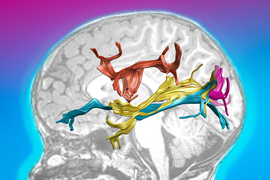
Scientists discover anatomical changes in the brains of the newly sighted

After a lifetime of blindness, newly sighted can immediately identify human locomotion

Early sound exposure in the womb shapes the auditory system

Vision is key to spatial skills
Previous item Next item
More MIT News

Understanding why autism symptoms sometimes improve amid fever
Read full story →
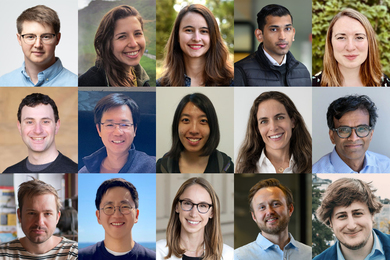
School of Engineering welcomes new faculty

Turning up the heat on next-generation semiconductors

Sarah Millholland receives 2024 Vera Rubin Early Career Award

A community collaboration for progress

MIT scholars will take commercial break with entrepreneurial scholarship
- More news on MIT News homepage →
Massachusetts Institute of Technology 77 Massachusetts Avenue, Cambridge, MA, USA
- Map (opens in new window)
- Events (opens in new window)
- People (opens in new window)
- Careers (opens in new window)
- Accessibility
- Social Media Hub
- MIT on Facebook
- MIT on YouTube
- MIT on Instagram
- SUGGESTED TOPICS
- The Magazine
- Newsletters
- Managing Yourself
- Managing Teams
- Work-life Balance
- The Big Idea
- Data & Visuals
- Reading Lists
- Case Selections
- HBR Learning
- Topic Feeds
- Account Settings
- Email Preferences
Your Team Members Aren’t Participating in Meetings. Here’s What to Do.
- Luis Velasquez

Ask yourself: What do people need to feel that their contributions are valued?
Traditional advice for leaders who want to increase meeting participation call for clarifying expectations, setting clear agendas, and asking open-ended questions. While these strategies have their merits, they might not always work because they’re usually based on the leader’s assumptions about what the team needs, rather than facts about what they actually need. Managers who want their teams to be more engaged in meetings need to foster a safe, inclusive team culture, which requires a deep understanding of their team’s unique dynamics. The author presents several strategies for encouraging employees to engage during meetings.
Sue, a former client of mine, was starting a new VP role at a fintech organization. She found out quickly that the team she inherited had a lower level of participation, collaboration, questioning, and general engagement than the one she had left behind. This was particularly evident in team meetings.
- Luis Velasquez , MBA, Ph.D. is an executive coach who works with senior leaders and their teams to become more cohesive, effective, and resilient. He is the founder and managing partner of Velas Coaching LLC , a leadership facilitator at the Stanford University Graduate School of Business, a former University professor, and research scientist. Connect with him on LinkedIn.
Partner Center
Numbers, Facts and Trends Shaping Your World
Read our research on:
Full Topic List
Regions & Countries
- Publications
- Our Methods
- Short Reads
- Tools & Resources
Read Our Research On:
Is College Worth It?
2. public views on the value of a college degree, table of contents.
- Labor force trends and economic outcomes for young adults
- Economic outcomes for young men
- Economic outcomes for young women
- Wealth trends for households headed by a young adult
- The importance of a four-year college degree
- Getting a high-paying job without a college degree
- Do Americans think their education prepared them for the workplace?
- Is college worth the cost?
- Acknowledgments
- The American Trends Panel survey methodology
- Current Population Survey methodology
- Survey of Consumer Finances methodology
We asked Americans what they think about the value of a four-year college degree from a few different angles:
- Is a degree important in order for someone to get a well-paying job in today’s economy?
- Has the value of a degree changed in recent decades?
- Can someone without a degree get a well-paying job?
- How useful do people think their own education was in preparing them for a well-paying job?
- Is the cost of college worth it today?
Four-in-ten Americans say it is not too or not at all important to have a four-year college degree in order to get a well-paying job in today’s economy.
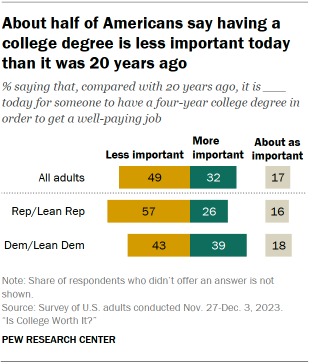
Only 25% say it’s extremely or very important to have a college degree, and 35% say it’s somewhat important.
We also asked the public about the importance of a college degree now versus 20 years ago.
About half of Americans (49%) say it’s less important today than it was in the past for someone to have a four-year degree in order to get a well-paying job. About a third (32%) say having a degree is more important now, and 17% say its importance hasn’t really changed.
Differences by party
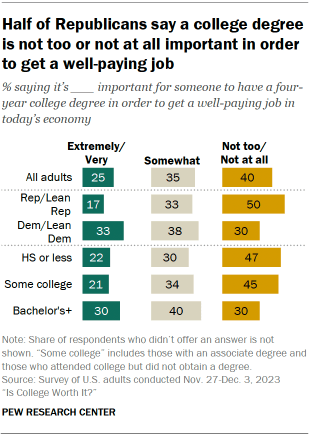
Half of Republicans and Republican-leaning independents – compared with 30% of Democrats and Democratic leaners – say it’s not too or not at all important to have a four-year college degree to get a well-paying job.
And a majority of Republicans (57%) say having a degree is less important today than it was 20 years ago; 43% of Democrats say the same.
These partisan gaps hold even after controlling for differences in the educational attainment of Republicans and Democrats.
Differences by education
College graduates are more likely than those with less education to say that having a college degree is extremely or very important (30% vs. 22%).
But views on whether having a college degree is more or less important today than it was 20 years ago don’t differ significantly by education. Roughly half of four-year college graduates (51%) and those with less education (48%) say it’s less important today for someone to have a college degree than it was in the past.
Adults with a postgraduate degree, however, have somewhat different views than those with a bachelor’s degree on both of these measures. Some 35% of postgraduates say it’s extremely or very important to have a four-year college degree in order to get a well-paying job, compared with 27% of those whose highest attainment is a bachelor’s degree.
And 39% of postgraduates – compared with 30% of those with a bachelor’s degree – say it’s more important to have a college degree today than it was 20 years ago.
Differences by age
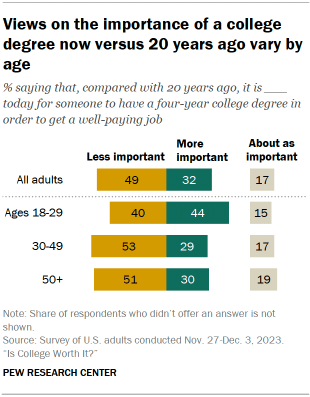
Young adults stand out in their views on the importance of a college degree today versus in the past.
Among those ages 18 to 29, 44% say having a degree is more important today in order to get a well-paying job than it was 20 years ago. By comparison, 29% of those 30 to 49 and 30% of those 50 and older say the same.
Americans also have mixed views when it comes to whether someone without a four-year college degree could get a well-paying job in today’s economy.
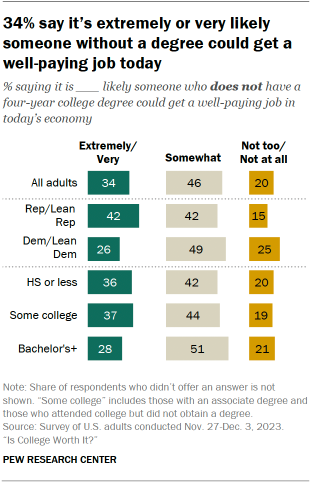
Only about a third (34%) say it’s extremely or very likely that someone withouta four-year degree could get this kind of job.
Nearly half say it’s somewhat likely that someone without a college degree could get a well-paying job, and 20% say it’s not too or not at all likely.
These views differ by:
- Partisanship: 42% of Republicans and 26% of Democrats say it’s extremely or very likely someone without a four-year degree could get a well-paying job. Among Democrats, 25% say it’s not too or not at all likely; just 15% of Republicans say the same.
- Education: 28% of adults with at least a bachelor’s degree say it’s extremely or very likely that someone without a college degree could get a well-paying job today. This compares with 37% of those with some college and 36% of those with a high school diploma or less education.
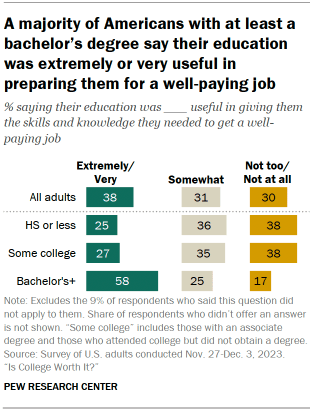
When thinking about how useful their own education was in giving them the skills and knowledge needed to get a well-paying job, a majority of those with a four-year college degree or more education (58%) say it was extremely or very useful. (This finding excludes the 9% of respondents who said this question did not apply to them.)
Adults with a postgraduate degree are especially likely to say their education was extremely or very useful: 72% say this, compared with 47% of those whose highest attainment is a bachelor’s.
By comparison, adults with less education have more mixed views. Among those who have not completed a bachelor’s degree, 38% say their education was not too or not at all useful in giving them the skills and knowledge needed to get a well-paying job; 35% say it was somewhat useful, and 26% say it was extremely or very useful.
These views don’t differ as substantially by age or by party.
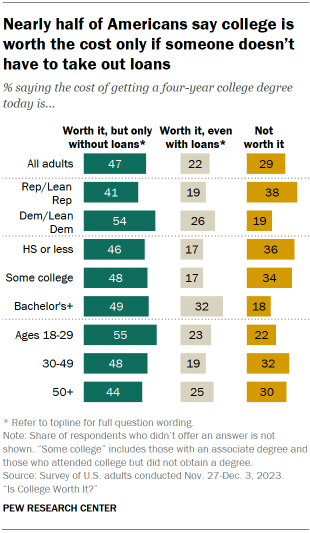
When asked about the cost of college these days, many Americans question whether it’s worth it if a student has to take on debt. Nearly half of adults (47%) say a four-year college degree is worth the cost, but only if someone doesn’t have to take out loans in order to attend.
Only 22% say college is worth the cost even if someone has to take out loans. And 29% say college isn’t worth the cost.
Meanwhile, data from the Federal Reserve shows that more than four-in-ten adults who attended college say they took out student loans for their education .
Views on the value of college differ by partisanship, education and age. But notably, in all groups except for Republicans, pluralities say the cost of college is worth it only if someone doesn’t have to take out loans.
A narrow majority of Democrats (54%) say the cost of getting a four-year college degree is worth it, but only if someone doesn’t have to take out loans. A smaller share of Republicans (41%) say the same.
About one-in-four Democrats (26%), compared with 19% of Republicans, say the cost is worth it even with loans.
Republicans are twice as likely as Democrats to say college is not worth the cost (38% vs. 19%).
Americans with at least a four-year college degree are much more likely than those with less education to say that college is worth the cost even if someone has to take out loans (32% vs. 17%).
Those with a postgraduate degree are among the most likely to express this view: 37% say college is worth the cost even after taking out loans. This compares with 29% among those with a bachelor’s but no postgraduate degree.
Even so, across all education levels, more say a four-year degree is worth the cost only if someone doesn’t take on debt than say it’s worth the cost with debt.
Those with some college or less education are about twice as likely as those with at least a bachelor’s degree to say the cost of getting a degree isn’t worth it at all (35% vs. 18%).
Young adults are more likely than their older counterparts to say the cost of a degree is worth it only if someone doesn’t take out loans: 55% of those ages 18 to 29 say this, compared with 48% of those 30 to 49 and 44% of those 50 and older.
And 18- to 29-year-olds are less likely to say the cost isn’t worth it at all (22% vs. roughly three-in-ten among older age groups).
Sign up for our weekly newsletter
Fresh data delivery Saturday mornings
Sign up for The Briefing
Weekly updates on the world of news & information
- Business & Workplace
- Economic Conditions
- Higher Education
- Income & Wages
- Recessions & Recoveries
- Student Loans
Half of Latinas Say Hispanic Women’s Situation Has Improved in the Past Decade and Expect More Gains
From businesses and banks to colleges and churches: americans’ views of u.s. institutions, fewer young men are in college, especially at 4-year schools, key facts about u.s. latinos with graduate degrees, private, selective colleges are most likely to use race, ethnicity as a factor in admissions decisions, most popular, report materials.
1615 L St. NW, Suite 800 Washington, DC 20036 USA (+1) 202-419-4300 | Main (+1) 202-857-8562 | Fax (+1) 202-419-4372 | Media Inquiries
Research Topics
- Email Newsletters
ABOUT PEW RESEARCH CENTER Pew Research Center is a nonpartisan fact tank that informs the public about the issues, attitudes and trends shaping the world. It conducts public opinion polling, demographic research, media content analysis and other empirical social science research. Pew Research Center does not take policy positions. It is a subsidiary of The Pew Charitable Trusts .
Copyright 2024 Pew Research Center
Wearable devices get signal boost from innovative material
Rice engineer and collaborators overcome radio frequency performance challenges in skin-interfaced electronics.
A new material that moves like skin while preserving signal strength in electronics could enable the development of next-generation wearable devices with continuous, consistent wireless and battery-free functionality.
According to a study published in Nature , an international team of researchers from Rice University and Hanyang University developed the material by embedding clusters of highly dielectric ceramic nanoparticles into an elastic polymer. The material was reverse-engineered to not only mimic skin elasticity and motion types, but also to adjust its dielectric properties to counter the disruptive effects of motion on interfacing electronics, minimize energy loss and dissipate heat.
"Our team was able to combine simulations and experiments to understand how to design a material that can seamlessly deform like skin and change the way electrical charges distribute inside it when it is stretched so as to stabilize radio-frequency communication," said Raudel Avila, assistant professor of mechanical engineering at Rice and a lead author on the study. "In a way, we are carefully engineering an electrical response to a mechanical event."
Avila, who was responsible for conducting simulations to help identify the right choice of materials and design, explained that electronic devices use radio frequency (RF) elements like antennas to send and receive electromagnetic waves.
"If you have ever been in a place with poor cellular reception or a very spotty Wi-Fi signal, you probably understand the frustration of weak signals," Avila said. "When we're trying to communicate information, we work at specific frequencies: Two antennas communicating with each other do so at a given frequency. So we need to ensure that that frequency does not change so that communication remains stable. The challenge of achieving this in systems designed to be mobile and flexible is that any change or transformation in the shape of those RF components causes a frequency shift, which means you'll experience signal disruption."
The nanoparticles embedded in the substrate served to counteract these disruptions, with a key design element being the intentional pattern of their distribution. Both the distance between the particles and the shape of their clusters played a critical role in stabilizing the electrical properties and resonant frequency of the RF components.
"The clustering strategy is very important, and it would take a lot longer to figure out how to go about it through experimental observations alone," Avila said.
Sun Hong Kim, a former research associate from Hanyang and now a postdoctoral researcher at Northwestern University, pointed out that the research team took a creative approach to solving the problem of RF signal stability in stretchable electronics.
"Unlike previous studies that focused on electrode materials or design, we focused on the design of a high-dielectric nanocomposite for the substrate where the wireless device is located," Kim said, highlighting the importance of collaboration across three different fields of expertise for developing "such a multidimensional solution to a complex problem."
"We believe that our technology can be applied to various fields such as wearable medical devices, soft robotics and thin and light high-performance antennas," said Abdul Basir, a former research associate from Hanyang and now a postdoctoral researcher at Tampere University in Finland.
Wearable technologies are having a profound impact on health care, enabling new forms of individual monitoring, diagnosis and care. Smart wear market predictions reflect the transformative potential of these technologies with health and fitness owning the largest share in terms of end use.
"Wireless skin-integrated stretchable electronics play a key role in health emergencies, e-health care and assistive technologies," Basir added.
To test whether the material could support the development of effective wearable technologies, the researchers built several stretchable wireless devices, including an antenna, a coil and a transmission line, and evaluated their performance both on the substrate they developed and on a standard elastomer without the added ceramic nanoparticles.
"When we put the electronics on the substrate and then we stretch or bend it, we see that the resonant frequency of our system remains stable," Avila said. "We showed that our system supports stable wireless communication at a distance of up to 30 meters (~98 feet) even under strain. With a standard substrate, the system completely loses connectivity."
The wireless working distance of the far-field communication system exceeds that of any other similar skin-interfaced system. Moreover, the new material could be used to enhance wireless connectivity performance in a variety of wearable platforms designed to fit various body parts in a wide range of sizes.
For instance, the researchers developed wearable bionic bands to be worn on the head, knee, arm or wrist to monitor health data across the body, including electroencephalogram (EEG) and electromyogram (EMG) activity, knee motion and body temperature. The headband, which was shown could stretch up to 30% when worn on the head of a toddler and up to 50% on the head of an adult, successfully transmitted real-time EEG measurements at a wireless distance of 30 meters.
"Skin-interfaced stretchable RF devices that can seamlessly conform to skin morphology and monitor key physiological signals require critical design of the individual material layouts and the electronic components to yield mechanical and electrical properties and performance that do not disrupt a user's experience," Avila said. "As wearables continue to evolve and influence the way society interacts with technology, particularly in the context of medical technology, the design and development of highly efficient stretchable electronics become critical for stable wireless connectivity."
- Electronics
- Wearable Technology
- Materials Science
- Mobile Computing
- Spintronics Research
- Artificial Intelligence
- Electrical engineering
- Information and communication technologies
- Tensile strength
- Passive infrared sensors
- Computing power everywhere
- Aspect-oriented programming
Story Source:
Materials provided by Rice University . Original written by Silvia Cernea Clark. Note: Content may be edited for style and length.
Journal Reference :
- Sun Hong Kim, Abdul Basir, Raudel Avila, Jaeman Lim, Seong Woo Hong, Geonoh Choe, Joo Hwan Shin, Jin Hee Hwang, Sun Young Park, Jiho Joo, Chanmi Lee, Jaehoon Choi, Byunghun Lee, Kwang-Seong Choi, Sungmook Jung, Tae-il Kim, Hyoungsuk Yoo, Yei Hwan Jung. Strain-invariant stretchable radio-frequency electronics . Nature , 2024; DOI: 10.1038/s41586-024-07383-3
Cite This Page :
Explore More
- Future Climate Impacts Put Whale Diet at Risk
- Charge Your Laptop in a Minute?
- Caterpillars Detect Predators by Electricity
- 'Electronic Spider Silk' Printed On Human Skin
- Engineered Surfaces Made to Shed Heat
- Innovative Material for Sustainable Building
- Human Brain: New Gene Transcripts
- Epstein-Barr Virus and Resulting Diseases
- Origins of the Proton's Spin
- Symbiotic Bacteria Communicate With Plants
Trending Topics
Strange & offbeat.
A .gov website belongs to an official government organization in the United States.
A lock ( ) or https:// means you've safely connected to the .gov website. Share sensitive information only on official, secure websites.
- About Mild TBI and Concussion
- After a Mild TBI or Concussion
- Health Disparities in TBI
- Comparing Head Impacts
- Publications
- National Concussion Surveillance System
- Clinical Guidance
- Mild Traumatic Brain Injury Management Guideline
- Resources for Health Care Providers
Facts About TBI
- A TBI affects how the brain works.
- TBI is a major cause of death and disability.
- TBIs may be missed in older adults.
- A TBI may lead to short- or long-term health problems.
- A TBI during childhood may affect brain development.

A TBI affects how the brain works

A traumatic brain injury, or TBI, is an injury that affects how the brain works. It may be caused by a:
- Bump, blow, or jolt to the head, or
- Penetrating injury (such as from a gunshot ) to the head
There are three main types of TBI:
- Mild TBI or concussion
- Moderate TBI
TBI is a major cause of death and disability
There were over 69,000 TBI-related deaths in the United States in 2021. 1 That's about 190 TBI-related deaths every day.
TBIs affect the lives of people of all ages. Anyone can experience a TBI, but data suggest that some groups are at greater risk of dying from a TBI or experiencing long-term health problems after the injury. 2 Examples of groups who are more likely to be affected by TBI, include:
- Racial and ethnic minorities 3
- Service members and veterans 4
- People who experience homelessness 5
- People who are in correctional and detention facilities 6
- Survivors of intimate partner violence 7
- People living in rural areas 8
Learn more about health disparities and TBI .
How TBIs happen
People most commonly get TBIs from a fall, firearm-related injury, motor vehicle crash, or an assault.
Research shows that:
- Falls lead to nearly half of the TBI-related hospitalizations. 9
- Firearm-related suicide is the most common cause of TBI-related deaths in the United States. 3 10
- Motor vehicle crashes and assaults are other common ways a person may get a TBI. 9
For more detailed information on the leading ways people get TBIs and the groups of people most likely to get a TBI, check out CDC's TBI data reports .
Populations
Tbis may be missed in older adults.
Older adults are more likely to be hospitalized and die from a TBI compared to all other age groups. 9 Still, TBIs may be missed or misdiagnosed in older adults because symptoms of TBI overlap with other medical conditions that are more common among older adults, such as dementia.
Healthcare providers should check for signs and symptoms of TBI if an older adult has:
- Fallen or has a fall-related injury, such as a hip fracture.
- Been in a car crash.
This is especially important among older adults who are taking blood thinners, 11 such as:
- Anticoagulants like warfarin (Coumadin), rivaroxaban (Xarelto), and apixaban (Eliquis).
- Antiplatelet medications like clopidogrel (Plavix), ticagrelor (Brilinta), and acetylsalicylic acid (Aspirin).
These medicines may increase the risk for bleeding in the brain following a TBI. 11 Bleeding in the brain after a TBI may put a person at risk for more severe injury or death.
Potential effects of TBIs
A tbi may lead to short- or long-term health problems.
Depending on the severity of the injury, those who get a TBI may face health problems that last a few days or the rest of their lives. For example, a person with a mild TBI or concussion may experience short-term symptoms and feel better within a couple of weeks or months. And a person with a moderate or severe TBI may have long-term or life-long effects from the injury.
A person with a possible TBI should be seen by a healthcare provider. Your healthcare provider may have treatment to help speed your recovery.
- Most people with a mild TBI or concussion can recover safely at home following a medical check-up.
- People with a moderate or severe TBI may need ongoing care, such as rehabilitation services, to help with their recovery.
A TBI during childhood may affect brain development
TBI affects children differently than adults. An injury of any severity to the developing brain may:
- Disrupt a child's development.
- Limit their ability to participate in school and other activities, like sports.
As a result of a TBI, children may experience changes in their health, thinking, and behavior that affect learning, self-regulation, and social participation, all of which are important to becoming a productive adult. 12
CDC's Report to Congress on the management of traumatic brain injury in children details the potential effects of a TBI on children and their families. 12
- Centers for Disease Control and Prevention. National Center for Health Statistics: Mortality data on CDC WONDER. Available at: https://wonder.cdc.gov/mcd.html .
- Centers for Disease Control and Prevention, National Center for Injury Prevention and Control. Health disparities and TBI. Available at: https://www.cdc.gov/traumatic-brain-injury/health-equity/index.html .
- Daugherty J, Waltzman D, Sarmiento K, Xu L. Traumatic brain injury–related deaths by race/ethnicity, sex, intent, and mechanism of injury — United States, 2000–2017 . MMWR Morb Mortal Wkly Rep . 2019;68(46):1050-1056.
- Centers for Disease Control and Prevention, National Institutes of Health, Department of Defense, and Veterans Administration. Report to Congress on traumatic brain injury in the United States: Understanding the public health problem among current and former military personnel . Atlanta (GA): Centers for Disease Control and Prevention; 2013.
- Stubbs J, Thornton A, Sevick J, et al. Traumatic brain injury in homeless and marginally housed individuals: A systematic review and meta-analysis. Lancet Public Health. 2020;5(1):e19-e32.
- Durand E, Chevignard M, Ruet A, Dereix A, Jourdan C, Pradat-Diehl P. History of traumatic brain injury in prison populations: A systematic review. Ann Phys Rehabil . 2017;60(2):95-101
- St Ivany A, Schminkey D. Intimate Partner Violence and Traumatic Brain Injury: State of the Science and Next Steps. Fam Community Health . 2016;39(2):129-37.
- Chapital A. Traumatic brain injury: outcomes of a rural versus urban population over a 5-year period. Hawaii Med J . 2007 Dec;66(12):318-21.
- Centers for Disease Control and Prevention, National Center for Injury Prevention and Control.
- Miller GF, Kegler SR, Stone DM. Traumatic brain injury–related deaths from firearm suicide: United States, 2008–2017. 2020(0):e1-e3.
- Maegele M, Schöchl H, Menovsky T, Maréchal H, Marklund N, Buki A, Stanworth S. Coagulopathy and haemorrhagic progression in traumatic brain injury: advances in mechanisms, diagnosis, and management. Lancet Neurol . 2017 Aug;16(8):630-647.
- Centers for Disease Control and Prevention, National Center for Injury Prevention and Control. Report to Congress on the management of traumatic brain injury in children. Atlanta (GA): Centers for Disease Control and Prevention; 2018.
- Centers for Disease Control and Prevention, National Center for Injury Prevention and Control. Report to Congress on traumatic brain injury in the United States: Epidemiology and rehabilitation . Atlanta (GA): Centers for Disease Control and Prevention; 2015.
- Centers for Disease Control and Prevention, National Center for Injury Prevention and Control. Report to Congress on mild traumatic brain injury in the United States: Steps to prevent a serious public health problem . Atlanta (GA): Centers for Disease Control and Prevention; 2003.
Traumatic Brain Injury & Concussion
A traumatic brain injury, or TBI, is an injury that affects how the brain works. TBI is a major cause of death and disability in the United States.
For Everyone
Health care providers.

IMAGES
VIDEO
COMMENTS
To recap, the "Big 5" assessment criteria include: Topic originality and novelty. Value and significance. Access to data and equipment. Time requirements. Ethical compliance. Be sure to grab a copy of our free research topic evaluator sheet here to fast-track your topic selection process.
Select a topic. Choosing an interesting research topic is your first challenge. Here are some tips: Choose a topic that you are interested in! The research process is more relevant if you care about your topic. Narrow your topic to something manageable. If your topic is too broad, you will find too much information and not be able to focus.
Review your course materials. Your textbook, syllabus, and class notes can help you find a topic. If you're writing your paper for a class, skim through your course materials to see what sparks your interest. Major academic journals in your field of study might also give you ideas for a topic. [1]
Step 2: Brainstorm Your Topics. You aren't doing research at this stage yet. You are only trying to make considerations to determine which topic will suit your research assignment. The brainstorming stage isn't difficult at all. It should take only a couple of hours or a few days depending on how you approach.
Step 1: Check the requirements. Step 2: Choose a broad field of research. Step 3: Look for books and articles. Step 4: Find a niche. Step 5: Consider the type of research. Step 6: Determine the relevance. Step 7: Make sure it's plausible. Step 8: Get your topic approved. Other interesting articles.
The first step in doing research is choosing a good topic. A good research topic should be focused and clear and not something that can be answered by a Google search. For example, instead of asking "Why is social media harmful?" you could ask, "How is interacting with social media, like TikTok and Twitter, impacting the mental health of ...
Introduction. This guide is aimed at law students selecting a research paper topic. You should aim to find a specific, original research issue that you find fascinating. The process for choosing a topic varies but might involve the following steps. Brainstorm about areas of interest.
Step 1: Choose your topic. First you have to come up with some ideas. Your thesis or dissertation topic can start out very broad. Think about the general area or field you're interested in—maybe you already have specific research interests based on classes you've taken, or maybe you had to consider your topic when applying to graduate school and writing a statement of purpose.
It is often helpful to state your topic in the form of a question. Treat the research project as an attempt to find a specific answer for a specific question. List Main Concepts . Pull out ideas and key terms that describe your topic. You can get a better idea of these by looking up your topic in an encyclopedia or other appropriate reference work.
Defining a Topic - SAGE Research Methods. Develop My Research Idea - Academic Writer. Note: You MUST create an Academic Writer account AND start a paper in order to access this tool. Once you have done so, open a paper and click Research Lab Book in the left navigation menu. The Process for Developing Questions - ASC Guide.
113 Great Research Paper Topics. One of the hardest parts of writing a research paper can be just finding a good topic to write about. Fortunately we've done the hard work for you and have compiled a list of 113 interesting research paper topics. They've been organized into ten categories and cover a wide range of subjects so you can easily ...
When deciding on a topic, there are a few things that you will need to do: Brainstorm for ideas. Choose a topic that will enable you to read and understand the articles and books you find. Ensure that the topic is manageable and that material is available. Make a list of key words. Be flexible.
Three Approaches for Developing a Topic. Approach #1: List Key Words of Interest. Make lists of concepts and topics you find interesting, as well as lists of related words and synonyms. These can serve as your key search terms. Concept 1: Concept 2: Look For:
3. Look up general information about the topic. Once you've got an idea for a more narrow topic you want to focus on, do an online search to see generally what information is out there about it. At this point, pay attention to the amount of information available and the issues raised by some of that information.
Before selecting a topic or starting your research, make sure you understand your assignment. Consider: Have you been assigned a topic or can you pick your own? How many pages/words do you need to write? How long is your presentation? Do you need to include specific types of sources (e.g. scholarly journal, book, etc.)? When is the assignment due?
Some websites, like Project Muse and JSTOR, are an excellent resource for periodicals, academic papers, and other primary sources. You can usually access them through your University or public library. There's also some free alternatives to these websites, like Google Scholar and SSRN . But if you're writing a deep-dive on dairy advertisements ...
Writing Your Research Question. Writing your research topic as a question helps you focus your topic in a clear and concise way. It ensure that your topic is arguable. While not all research papers have to offer an explicit argument, many do. For the above example, you might phrase your research question like this: "How has radiation therapy ...
3. Start broad and narrow your focus. Once you have a general topic that interests you, begin by reading widely about it. Write down the ideas, information, and sources that interest you the most. Then, review your notes to start refining your topic into a precise, narrow research focus. [3]
The purpose of a research topic is to identify a specific area of inquiry that the researcher wants to explore and investigate. A research topic is typically a broad area of interest that requires further exploration and refinement through the research process. It provides a clear focus and direction for the research project, and helps to ...
Get Started; Step 1: Develop a Topic Toggle Dropdown. 1a. Select a Topic ; 1b. Develop Research Questions ; 1c. Identify Keywords ; 1d. Find Background Information ; 1e. Refine a Topic ... For research help, use one of the following options: Ask the GTL General Information & Research Help Phone: (607) 735-1862
Judge the scope of the project. Reevaluate the research question based on the nature and extent of information available and the parameters of the research project. Select the most appropriate investigative methods (surveys, interviews, experiments) and research tools (periodical indexes, databases, websites). Plan the research project.
New MIT research offers a possible explanation for how the brain learns to identify both color and black-and-white images. The researchers found evidence that early in life, when the retina is unable to process color information, the brain learns to distinguish objects based on luminance, rather than color.
Connect with him on LinkedIn. Traditional advice for leaders who want to increase meeting participation call for clarifying expectations, setting clear agendas, and asking open-ended questions ...
Differences by age. Young adults stand out in their views on the importance of a college degree today versus in the past. Among those ages 18 to 29, 44% say having a degree is more important today in order to get a well-paying job than it was 20 years ago. By comparison, 29% of those 30 to 49 and 30% of those 50 and older say the same.
Nature, 2024; DOI: 10.1038/s41586-024-07383-3. Rice University. "Wearable devices get signal boost from innovative material." ScienceDaily. ScienceDaily, 22 May 2024. <www.sciencedaily.com ...
A traumatic brain injury, or TBI, is an injury that affects how the brain works. It may be caused by a: Bump, blow, or jolt to the head, or. Penetrating injury (such as from a gunshot) to the head. There are three main types of TBI: Mild TBI or concussion. Moderate TBI.
Custom copilot is pre-populated with information from the file/folder selection. The copilot has a default folder name, branding, description, sources you've selected, and other fields already. You can keep these fields and parameters as-is, or easily update them. Customize the identity with a name change. Customize the grounding knowledge.